
Choosing a College

When Should You Schedule Visits to Colleges?
For most students, the college visit is the most important deciding factor in the college they choose to go to. this makes planning college visits an important part of the selection process, that should be scheduled early enough in the process that you don’t feel rushed, but late enough so that your child has had some time to do some research first., how early should you begin visiting schools.
It may be beneficial to schedule one or two trips to nearby colleges while your child is in their freshman or sophomore year. This is simply to get them thinking about colleges and getting into the mode of college planning.
By starting this early your child may have an easier time narrowing down their initial list, as they begin to get a better idea of what it is they want in a college. It also allows plenty of time for you and your child to learn about any special admission requirements, or make initial contact with faculty and/ or coaches if applicable to your situation.
There is also some evidence to suggest that visiting a college early and often can actually boost your chance of admission in that college. Admissions officers will see when and how often a student has visited when researching the student and take an early visit as a good indication of the student’s serious interest. Students who express serious interest are more likely to get accepted and often receive better financial aid packages. Admissions officers are able to invest time in your student early and get a good feel for whether or not this student is a good fit.
We recommend doing the bulk of your visits when your child is in their junior year after they have already done some research into what they are looking for. It’s common for a student to “fall in love” with a school during the college tour, so you want to make sure any school you visit is one that is a good choice for your student, both academically and financially.
What Time of Year is Best?

Visiting colleges during the summer is convenient, but it doesn’t always give you the best or honest view of the college or university. It’s hard to get an accurate picture of how busy the student union becomes and how difficult it can be to walk from one part of the campus to the other between classes. Your student also won’t have an accurate feel for how he’ll interact with faculty when there’s a lot of students around.
So when should you schedule your campus visit? The best time during the week is from Monday to Thursday. The campus is busy with students going from class to class or mingling around.
The best season to visit colleges is at the beginning of the fall session . The time various from college to college and includes late-summer to the early of September. Spring time can also be ideal especially for students who plan to participate in athletics or are considering early application deadlines.
Don’t go to colleges during mid-term or final examination weeks. Those times are similar to summer, they won’t give you an accurate view of the college.
Also, don’t visit colleges during:
- Christmas week
- Thanksgiving weekend
- Spring break
- Winter break
- Reading periods
Attend a Class or Two
Visiting a class, especially in your student’s major, will give him a slice of college life. It may be helpful to attend more than one type of class such as a lecture, lab or seminar. It’ll give you and your student a chance to:
- Observe other students
- Experience attending different classes
- Listen to students’ perspectives
- Form an opinion about the college or university
Final Tips for Success
Take a camera and notebook with you . It’ll help you remember all the details of each visit. You’ll be shocked at how easy details begin to blur after visiting more than two colleges. Make a comparison sheet to record impressions you and your student have about each college.
Don’t get totally wrapped up in the pretty leaves and picturesque buildings. It is important that your child feel comfortable and enjoy their surroundings, but it is much more important that you feel confident that your sending your child to a school where they’ll get a great education for a fair price.
Go on a Virtual Tour. Some schools offer virtual tours you can check out before the actual tour to get acquainted, or after to refresh your memory. Try one here.
Begin building a college list of good matches with your student.
Leave a Reply Cancel reply
Your email address will not be published. Required fields are marked *
Subscribe to Parent Newsletter

Choose Your Test
Sat / act prep online guides and tips, do you need to go on college tours 4 reasons to visit.
College Admissions

You’ve probably felt the pressure to go on college tours, but just how important are they? Are they an essential part of the college planning process, or is it not a big deal if you opt out?
This guide will go over the most important reasons to visit a college, along with some circumstances when you might choose not to tour. We’ll also discuss how you can prepare to make the most out of your college visits.
First off, what are some reasons you should tour your prospective colleges?
Why Should You Tour Your Colleges?
There are several strong reasons to visit your colleges of interest. For one, seeing and learning about the school in person can be a huge help in determining where you want to apply . You can find out more about the college from firsthand sources, like your tour guide and other current students.
All of these impressions can serve as useful material if you need to have a college interview or write a supplemental essay about why you want to attend. Finally, having your name on the tour rosters can mark what many admissions officers call “demonstrated interest.”
Let’s take a look at each of these reasons in more detail, starting with how useful it can be to see a college and its surrounding environment in person.

See the college campus and its surrounding environment with your own eyes, like this intrepid explorer.
Reason #1: To See the School and City in Person
One of the most compelling and important reasons to tour your college is to see it firsthand! These are the classrooms, dorms, and library you’ll be living in for the next four years; you want to check them out in person before committing. Walk around, soak up the atmosphere , and listen to what your intuition tells you about how it would suit your personal and academic goals.
A college tour will let you see the buildings inside and out, including classrooms, dorms, dining halls, gyms, music rooms, and science labs. You can get a sense of what’s happening on campus on flyer-covered bulletin boards, and see the places where students congregate - especially if you visit when classes are in session.
The official tour will show you around campus, and you can check out the surrounding environment too. Some students are drawn to the busy, active vibe of New York City; others would prefer to study in a peaceful countryside setting. Some would love to see fall colors paint the trees on campus; others want to get as far away from the possibility of snow as they can.
As you explore the surrounding scenes, find out if there are cafes and movie theaters around, or if most students stay on campus to socialize. You may want to find out if the area's affordable or generally a safe place. If you're looking for mountains to climb, a suburban feel, a large music scene, or a big city full of business internship opportunities, you can see if the area has what you want.
Virtual tours and photos can only take you so far, and descriptions of colleges may be biased to promote it. The best way to get a genuine sense of the place is to explore it in person. You’re the one who will be attending, so you should first see it with your own eyes.

Learn about the college by going straight to the source.
Reason #2: To Learn About the School from Firsthand Sources
If your searches for school info have led down dead ends, then you know that admissions websites don’t always have the answers to all your questions. Tour guides will be there to answer any outstanding questions, plus they’ll teach you fun facts and history that give you a deeper insight into the college.
Most tour guides are current students who are big fans of the college. Since they’re students, they can give you firsthand knowledge of the student experience. In addition to getting your own questions answered, you can learn from the questions asked by others in the tour group.
Some tours involve an hour or so walk around campus. Others, though, involve a much more involved itinerary. You might be able to sit in on a lecture, meet with admissions officers or a professor, or even arrange to stay overnight in a dorm. That way, you’ll get tons of personalized guidance and stories from all different perspectives: faculty, administration, and perhaps most importantly, current students.
All of this can serve to fuel your excitement and enthusiasm about a school, which may empower you to produce an even stronger application. On the flip side, it may save you a lot of effort and an application fee if you discover, in the end, that the school’s not for you. Either way, clarifying your desires and reasons to attend is key before you apply.

Spark some ideas for any supplemental essays.
Reason #3: To Write a Killer “Why Us?” Essay
Besides amping up your motivation to create the best application you can, a college visit will help if you need to write an essay to the prompt, “Why us?” Not all colleges ask for this, but there are many that require a supplemental essay in which you delineate your reasons for wanting to attend.
Colleges want to ensure that you have specific knowledge of their culture, courses, professors, and other opportunities. If you can include something unique that you learned on a tour, rather than repeat info from their website, then your essay could stand out even more.
You don’t know what stories you’ll gain from your tour and exploring the surrounding area, so go with an open mind and see how your impressions translate to any supplemental essays that you may need to write. Just as some colleges ask you to write about your interest, some also keep track of their tour rosters to see if you “demonstrated interest” via a tour or communication with the admissions office.

Having your name on a campus tour list might officially document your "demonstrated interest."
Reason #4: To Officially Demonstrate Your Interest in the School
So far, we’ve talked about how personally illuminating it can be to tour your college and its surrounding environment. You may have also heard that touring can strengthen your chances of admission, because it shows you did your due diligence. So what’s the story with this idea of “demonstrated interest”? Does it really help you get accepted?
Admissions committees are, generally speaking, rather secretive about their processes. They emphasize that their process is a holistic one that considers the “whole student,” rather than pieces of data. While this system has its strengths, it also means that we don’t have clear answers about exactly how officers consider each piece of your application. In the end, we’re often left with the frustrating answer, “It depends.”
So as for how far demonstrated interest makes an impression on admissions officers, I’d also have to say, “It depends.” Generally speaking, the conventional wisdom seems to be correct - it can be in your favor for the college to have your name on its visit records.
The more you can connect with a school, by going on an official tour, emailing admissions officers, and/or speaking to faculty, the more interested in the school you’ll appear to be. It will seem as though you’ve been thorough in your research, and admissions officers can be fairly confident that, if given an offer of admission, you will accept and enroll.
Since colleges are looking to improve their yield - or increase the number of students who accept admission offers - they appreciate your “demonstrated interest.” A few admissions officers, furthermore, have said that they would perceive it as a lack of interest on the student’s part if she lived close by and didn’t ever take a tour.
This definitely isn't a make or break part of your application, but you certainly don’t want to come off as disinterested. Admissions officers value enthusiasm, excitement, and commitment.
On the other hand, some schools, probably for the sake of fairness or because they already have more than enough information to evaluate, don’t track your interest. Yale, for instance, says, “Yale does not track visits to campus or contact with our admissions staff for the purposes of evaluating applications." They want people to sign up for tours, so they have a sense of numbers, but they say they won’t look at it later.
Admissions officers understand that not everyone can tour a school. If you live far away, then they shouldn’t hold it against you. In the end, taking a tour is not essential, nor should it affect your admission chances very much.
If you live close to a college, then you should make every effort to demonstrate your interest by signing up and touring. If it’s geographically or financially difficult for you, don’t stress about it. In fact, there are a few reasons why it might not make sense for you to tour a school. Let’s look at what a few of these reasons are.

Don't worry if your college is just too far away.
Are There Any Reasons Not to Tour a School?
As I said above, don’t stress if it’s just way too difficult for you to visit a school. Some students apply to colleges across the country, and they might not have the time or money to visit all, or any, of their far-off prospective colleges. Others may be busy with after-school jobs or babysitting siblings, or they simply might not be able to afford the planes, trains, or automobiles to get there.
Distance and finances are two very understandable reasons for not being able to tour a college, despite your interest in seeing it firsthand. Hopefully, you can still reach out to administration and current students online and check out the photos and virtual college tours offered on many school websites.
Now, if your only reason for forgoing a tour is that you already know a lot about a school - perhaps a sibling already attended - I wouldn’t advise skipping it. It’s still a good idea to visit, demonstrate your interest, and shape your own impressions.
To reiterate, if visiting a school is burdensome or otherwise just not feasible for you, then don’t worry about it. If you have the means and time, then check it out! In that case, your next step should be signing up.

Like any good guest, make sure to RSVP to your college tour.
How Do You Sign Up for College Tours?
You can find tour schedules and sign-ups on each college’s website. You’ll often find this info on the admissions site under the heading of “Visit.” To get there most directly, you could search for “Name of College + Visit.”
If you want to check out what a few of these pages look like, you can see the tour information for Penn State , University of California at Berkeley , University of Chicago , and Harvard here. For colleges of historical interest, like Harvard, double check that you’re finding the tour for prospective freshmen , rather than a general historical tour!
You may notice that many schools offer a morning and afternoon tour. If you’re looking at schools that are close together, should you fit in two tours in one day?
How Many Tours Should You Sign Up for On the Same Day?
Since many schools offer two or more tours a day, some students try to fit in two or more in one day. While you may be able to check out two colleges if they’re close together, I recommend giving each visit the time it deserves. In addition to the one to two hours that most tours take, you may be able to sit in on a lecture or meet with an admissions officer.
Beyond the tour itself, you also should take some time to explore campus and the surrounding area, searching out the cafes, movie theaters, restaurants, concert halls, hiking paths, or whatever else you might be looking for in your life as a college student. So rather than rush around checking colleges off your list as fast as possible, make sure to take your time and make the most of your visit by focusing on one tour per day.
Most high school students are granted several excused absences in junior and senior year to visit colleges, and you may be able to find extra time by visiting on weekends. That being said, when’s a good time to visit colleges?

You'll see a much different college if you visit during the semester versus winter or summer break.
When’s the Best Time to Tour Schools?
Considering your school visits can help you determine what schools make your college list, it’s a good idea to visit in junior year or earlier. Most junior students are granted 3 to 4 excused absences to visit colleges. If you can’t miss a school day due to your high school's policy or a large workload, many colleges also offer tours on the weekends or over the summer.
The only drawback of visiting over the summer or, to some extent, on weekends is that you won’t get to see the college in full swing. There’s a big difference in the atmosphere if students are walking between class and studying on the lawn or the library versus cleared out and empty. Plus, with summer tours you may not have the opportunity for an overnight visit or to sit in on a lecture. Touring in the summer still beats no tour at all, but if you can, try to visit during fall or spring semester.
Colleges, by the way, usually have different vacations than do high schools. So if you’re too busy with assignments and after-school activities to tour during a school week, then you might go during February or April break or certain high school holidays that fall on a Monday.
You’ll be on vacation, but college students won’t be. This plan probably won’t work for the December holidays, though - colleges tend to have several weeks off, usually from early to mid-December to early to mid-January. Besides this big winter break, what other times are not ideal for touring?
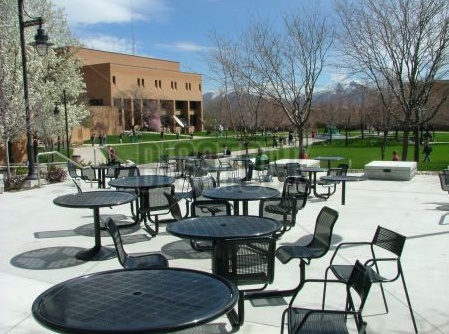
Hey, where'd everyone go?
When’s the Worst Time to Tour Schools?
Colleges have a different schedule than do high schools. You can take advantage of your vacation times to visit colleges when classes are in session, but you also should probably plan to avoid college break times.
In addition to winter break, colleges have breaks over Thanksgiving and typically in the second or third week of March (spring break!). Before the December holidays vacation, they usually have a “reading period,” a week or two during which students study for finals and then take their exams. Classes won’t be in session. Reading periods and exam weeks usually precede the end of the fall semester and end of the spring semester.
Finally, if you’re interested in visiting admissions offices, then you should check ahead to make sure this is a possibility. Admissions officers get busy with application review season in March and April , so if you’d like to visit at this time and meet with an admissions officer, just make sure they have time to talk with prospective students.
However, you can still gain a lot from walking around campus and checking out the facilities and the surrounding city even if classes aren’t in session. But if you plan ahead, you can make the most of your visit by visiting during the semester and getting the truest sense of the college in action.
Apart from signing up for the tour, you should also prepare some questions to connect with your tour guide and find out more information about the college.

Before you visit, prepare some questions to ask your college tour guide!
What to Prepare for Campus Tours
College tour guides are there to help! Most tour guides are current students who are enthusiastic about sharing info and insight into the school. Make the most of your visit by preparing questions to ask. It’s especially important to prepare a list of questions if you’re meeting with an administrator.
So what should these questions look like? They might include,
- How much time do you typically spend on homework?
- What’s the average class size? (You may specify this question for a certain department.)
- What kind of orientation programs are there for freshmen?
- Are there opportunities for research in nanoengineering (or whatever the subject might be)?
- Can you talk about the community service clubs?
- Is it common to study abroad ?
- What are the dorms like?
- How would you rate the food, on a scale from decent to inedible?
Do a lot of students belong to frats or sororities?
Really, you can ask anything you want to know that’s specific to your unique interests or goals. Find out answers to your questions that aren’t already available on the school website.
Now that you’ve made it this far, let’s summarize what you need to remember about why, when, and how to visit your prospective colleges.
To Sum Up...
If you're able to find the time, money, and transportation to visit your colleges, I highly recommend doing so. Not only will you learn a ton of important info about the school, but you'll get to see and sense the general atmosphere of the campus and its surrounding area. Since this is the place where you could learn, live, and grow for four years, you want to make sure it fits your goals and personality.
Most schools give juniors three to four excused absences to tour, plus you can go during your winter or spring breaks since colleges have different vacation schedules. Try to prioritize visiting when classes are in session. That way, you'll have more chances to sit in on a lecture, meet with administration or faculty, and get an authentic sense of the college when it's in full swing.
Sign up for tours online, and spend plenty of time exploring. Show up with some questions in mind. Your tour guide can especially give you genuine insight into the student experience and social scene on campus.
Visiting colleges will be a huge help in determining where you do and don't want to apply. In addition to weighing the courses and facilities the colleges have to offer, you should also make sure to listen to your intuition.
Take some time alone to sit on a bench or steps outside the library, look around, and see if you can picture yourself there. If you feel it would be a great fit, you may, after your visit, be even better equipped to communicate why in your application. Then, hopefully, admissions officers will feel the same way!
What's Next?
Just as you should explore the surrounding environment when you visit college campuses, you should also take the time to think about what kind of place would best fit you. Do you want to go to a big school or a small school ? Do you want to stay close to home or look farther away ? Check out these guides for more on how to decide and what other factors to consider when creating your college list.
Another concern when making your college list may be financial aid. If this is important to you, check out these 27 colleges with the best financial aid!
Want to improve your SAT score by 160 points or your ACT score by 4 points? We've written a guide for each test about the top 5 strategies you must be using to have a shot at improving your score. Download it for free now:

Rebecca graduated with her Master's in Adolescent Counseling from the Harvard Graduate School of Education. She has years of teaching and college counseling experience and is passionate about helping students achieve their goals and improve their well-being. She graduated magna cum laude from Tufts University and scored in the 99th percentile on the SAT.
Student and Parent Forum
Our new student and parent forum, at ExpertHub.PrepScholar.com , allow you to interact with your peers and the PrepScholar staff. See how other students and parents are navigating high school, college, and the college admissions process. Ask questions; get answers.

Ask a Question Below
Have any questions about this article or other topics? Ask below and we'll reply!
Improve With Our Famous Guides
- For All Students
The 5 Strategies You Must Be Using to Improve 160+ SAT Points
How to Get a Perfect 1600, by a Perfect Scorer
Series: How to Get 800 on Each SAT Section:
Score 800 on SAT Math
Score 800 on SAT Reading
Score 800 on SAT Writing
Series: How to Get to 600 on Each SAT Section:
Score 600 on SAT Math
Score 600 on SAT Reading
Score 600 on SAT Writing
Free Complete Official SAT Practice Tests
What SAT Target Score Should You Be Aiming For?
15 Strategies to Improve Your SAT Essay
The 5 Strategies You Must Be Using to Improve 4+ ACT Points
How to Get a Perfect 36 ACT, by a Perfect Scorer
Series: How to Get 36 on Each ACT Section:
36 on ACT English
36 on ACT Math
36 on ACT Reading
36 on ACT Science
Series: How to Get to 24 on Each ACT Section:
24 on ACT English
24 on ACT Math
24 on ACT Reading
24 on ACT Science
What ACT target score should you be aiming for?
ACT Vocabulary You Must Know
ACT Writing: 15 Tips to Raise Your Essay Score
How to Get Into Harvard and the Ivy League
How to Get a Perfect 4.0 GPA
How to Write an Amazing College Essay
What Exactly Are Colleges Looking For?
Is the ACT easier than the SAT? A Comprehensive Guide
Should you retake your SAT or ACT?
When should you take the SAT or ACT?
Stay Informed
Get the latest articles and test prep tips!
Looking for Graduate School Test Prep?
Check out our top-rated graduate blogs here:
GRE Online Prep Blog
GMAT Online Prep Blog
TOEFL Online Prep Blog
Holly R. "I am absolutely overjoyed and cannot thank you enough for helping me!”
- High School
- College Search
- College Admissions
- Financial Aid
- College Life

Juniors, Now’s the Time to Schedule Your College Visits
Juniors, it’s time for you to get started on college visits.
Whether you’re thinking about knocking out one or two or hitting a series of colleges, here is your go-to guide for setting up a college visit.
We’ll walk you through a steps to take before, during and after visits to help you find your perfect fit.
And if COVID-19 protocols are still underway, don’t miss our article about what to do when you can’t tour colleges in person .
What Can Juniors Do Right Now?
Juniors can do a lot right now, including developing a checklist and other things you can put on the family calendar.
Step 1: Start talking.
That’s right. Sit down and have a conversation with your family.
What are you thinking you want to do for college? Do you think you want to go to a large school? A small school? What fits your personality and preferences?
Start talking with adults you trust about schools that make sense for your needs.
Step 2: Brainstorm.
Have no idea where to start? Start a brainstorming session where you write down your visions about what you think your college experience might be like.
Rather than throwing a dart at a map and jumping in the car, it’s a good idea to ask yourself a few questions:
- Do you see yourself going to a large or small school?
- Do you want a lot of personalized attention?
- Are you looking for a more selective institution?
- How far away from home do you want to live?
- When you envision college, what do you think of?
In other words, think broadly about your college visit choices, then think more narrowly about the colleges you’d like to visit.
Put a premium on relationships when you make this list.
What kind of people do you want to meet? What type of individuals do you want to learn from?
Remember, college is about way more than pretty residence halls, beautiful buildings and other aesthetic things. It’s about the people who influence you along the way.
Step 3: Research at least one college.
Choose at least one college and do as much research as you can. Learn more about that particular school’s:
- Admission criteria
- Results — how many students go to graduate school, get a job after graduation, etc.
- School profile
- Academics and selectivity: Are you looking for a serious academic environment? Would you rather go to a school that focuses on undergraduate teaching — or research?
- Potential majors
- Housing information
- Extracurricular activities
- Athletics opportunities
After you narrow down some of the “big” things, like distance from home and general experience, then you can start thinking about things like major, requirements and more.
Does this college college or university you’ve researched fit the bill? If not, look for another one. If that one makes sense, move toward school as your first visit.
Step 4: Check the calendar.
Once you’ve honed in on your first college to visit, figure out what visit day fits into your schedule. Check your calendar and your family members’ calendars too. Remember, mom and dad likely have to drive you to your visit or coordinate flights. You need to plan the visit with your parents, and you might need to make sure your brothers’ and sisters’ schedules are open too.
How to Set Up a College Visits
First of all, make sure you (the student!) call the schools where you’re interested in setting up a visit.
Your mom or dad should not make the call. It’s time to put some of those adulting skills into practice.
Step 1: Think through what you want to do on your visit.
Who are the must-see people on your radar—the soccer coach, tutoring center, a financial aid advisor? It’s OK if you’re not sure. You can work through some of these questions when you make your phone call to the admissions office.
Step 2: Call the college or university’s admissions office.
Don’t set up a visit online. Talk to an actual person.
Or, if you do set up a visit online, call and make sure the admissions office received your scheduled visit—and that it didn’t get lost in cyberspace.
Have a detailed conversation about what you’d like to do when you’re on the visit.
Step 3: Ask for a personal campus visit.
Try to steer clear of group visit days.
Naturally, you’re an individual and have specific interests and needs.
When you’re stuck on a group visit, no one student will have the same interests as you. You could get stuck touring the gym for 25 minutes of your hour-long tour (even if you’re not an athlete or hate the thought of a treadmill). Who wants that?
A personal campus visit ensures your visit is all about you and nobody else.
Step 5: Get ready!
You don’t want to start a college visit without doing some preparation. You want to know as much as possible about the college you’re visiting before you visit.
Simple. You don’t want to waste time learning stuff you already know. If you already know the basics, like the size of the college, majors available and costs, why spend time relearning stuff you already know?
Plus, it brings camaraderie with the admission staff or chemistry professors when you say, “Yeah! And that biochemistry secondary major—that sounds cool.”
You’ll never believe how much people’s eyes light up when you know something about the college or university already.
What to Do During/After Visits
When you arrive at the admissions office, go to the campus visit coordinator’s desk and introduce yourself. That individual will help you get your day started in the right direction.
While you’re on your visit, do your best to ask great questions. You want to think of questions before you visit and ask everyone questions. Get each person talking about the college or university you’re visiting. It’s best to get candid thoughts from each individual you talk to.
This may sound like a pain, but it’s a good idea to get all your thoughts together and take a minute or two to jot down all your initial reactions to the college you’ve just visited. Grab your phone and type in some notes on the card or plane ride home.
Believe it or not, it’s difficult to remember each individual school after your 10th college visit.
Now’s the Time!
Juniors, we’ve offered everything you need to know about how to schedule a college visit .
It’s a matter of sitting down with your family members or other trusted adults, pouring over Niche’s 2021 college rankings and making lists of what matters to you.
It’s going to be a great time, so have fun with the process.
Ready to Find Your Niche? Create an Account
Author: Melissa Brock
Melissa Brock is the founder of College Money Tips and Money editor at Benzinga. She loves helping families navigate their finances and the college search process. Check out her essential timeline and checklist for the college search!
More Articles By Niche
While many current college students tout the importance of being able to actually step foot onto the campus you might go to, sometimes the circumstances just do not work out.
At Niche, we know a college is more than its stats or buildings. We also know it can be hard to figure out a college’s vibe or how students feel about it from its website alone. Using our comprehensive college profiles and social media accounts, you can get a sense of what life at a college is really like. Here are three simple ways to do that.
In case you haven’t heard yet, Niche has an amazing new opportunity for high school seniors. Niche Direct Admissions is a program that allows participating colleges to accept students and offer scholarships based on their Niche Profile. That’s right — no application needed.

Disclosure: This article contains affiliate links, meaning that when you make a purchase, I earn a small commission. For more information, see the site Disclaimer .
College Visits for Juniors: A Perfect Time for Campus Tours
Are you wondering when to do college visits? Should high school juniors visit colleges?
College visits for juniors are ideal! (Although of course you can start visiting colleges at any time during high school!)
Campus visits are an important part of the college search process. Students learn what they like and dislike about different colleges and find out what college life might like for them.
Junior year of high school is a great time to visit college campuses. College visits for high school juniors will help them learn about colleges and decide where to apply.
During freshman and sophomore year of high school, students are starting to take advanced classes and trying out different activities as they prepare for college .
By their junior year, students have a pretty good sense of what subjects they like, what area of study they might like to pursue as a college major, and who they are as a person.
Then, the closer students get to their final year of high school, the busier their schedules are with sports, classes, extracurriculars, and friends.
Visiting colleges as a high school junior is the best way to to decide if a college is right for you. This blog post is all about why juniors should colleges, how to plan college visits, and what to do on college visits!

Why High School Juniors Should Visit Colleges
1. high school juniors are ready to see what college is really like.
Juniors in high school are pretty mature. They know what subjects they like and dislike.
High school juniors might have a sense of what they’d like to major in in college. They know college is just around the corner, but aren’t sure exactly how college will be different than high school.
College visits for juniors can help them see what college will really be like. Campus visits offer a glimpse into the many ways college differs from high school.
Juniors touring colleges can see what it’s like to live in a dorm and eat in a dining hall. Juniors can talk to professors and students about the academic rigor they can expect in college and how to prepare for it.
The campus tour guide will be a current student. They’ll share their experiences with classes, clubs, and college life, so that high school students touring the college will know more about what it’s like to go to college there.

2. College visits are Much less stressful before senior year
Waiting until senior year to start visiting colleges means that you will already be behind on deciding what college would be the right fit for you.
If you haven’t visited any colleges, it will be hard to know how you’d actually feel about attending the colleges on your list.
Will a large university make you feel lost in the crowd or excited about all the possibilities?
Will a small liberal arts college make you feel seen or stifled?
Will a big city campus make you feel energized or exhausted?
The college application process might feel more stressful because you’re not sure where to apply. If you haven’t narrowed down your list of colleges and researched them to be sure they’d be a good fit, it will take you longer to start your applications. You’ll also have to allow time for extra essays and scholarship applications.
Senior year is extremely busy. Seniors planning to go to college are probably taking several advanced or AP classes.
You might be playing a sport, participating in clubs, volunteering, or serving in a leadership role.
Of course, you’ll also be working on those college essays and applications. As a busy senior, finding time to visit colleges will be extremely challenging.
By visiting colleges as a junior, you’ll have time to visit more colleges. You’ll be able to reflect on what you liked and disliked about each one. You’ll have time to do more research and talk to students or professors about each college you’re considering.
3. Junior year college tours will help you plan your senior year
By visiting colleges during your junior year, you can find out what classes you need to take your senior year to help you get accepted into the college or a certain major.
You definitely don’t want to opt out of a class your senior year, only to then find out that it’s recommended or required by the college you want to attend.
When you meet with a college admissions counselor, you can ask specific questions and find out what you need to do to stand out as an applicant (like adding more test prep to boost SAT or ACT scores) .
4. Visit colleges junior year to help you plan college applications
By visiting colleges as a high school junior, you can decide what colleges or what type of colleges you want to apply to well before the fall of your senior year.
Visiting colleges during the junior year of high school takes the pressure off each visit because students still have plenty of time to finalize the list of colleges they will apply to.
You’ll also learn more about what colleges are looking for in their applicants. After visiting a college, you will be more inspired to write the essential “Why do you want to attend this college?” essay prompt.
Also, you’ll learn about the college’s timeline for applications and scholarships. An admission counselor might even tell you about some scholarships that aren’t mentioned online.
Visiting college campuses before you send in applications will help you choose to apply to colleges where you feel confident you’d be happy. It’s so important to learn what colleges you want to mark off your list and not bother applying to long before you start applications.

5. Learn what you are looking for in a college
By taking the time to visit colleges long before it’s time to apply to colleges, you’ll have better opportunities to decide what you do (and don’t) like about different colleges. When you finalize your list of colleges to apply to, you’ll know what matters to you.
College visits are a key way students decide if a college would be a good fit for them.
If you take the time to visit colleges as a junior, you’ll have more opportunities to decide what you do and don’t like, what matters most in a school, what size school fits you best, and what vibe you’re looking for in a college.
6. You won’t have to miss school your senior year
Tour colleges your junior year, during fall break, winter break, and spring break, so you can maximize how many colleges you visit.
Visiting colleges your junior year during school breaks means you can take a lot of college tours without worrying about what you’re missing when you’re not at school. Also, touring colleges on school breaks means that you can take a vacation and tour colleges all in one trip!
Visit colleges on summer break
You can visit colleges the summer before and the summer after your junior year of high school. Then, you can plan your college visits around your summer family vacations.
Summer college visits mean you don’t have to stress about missing school or making up assignments. Also, summer college tours allow more time to visit farther away destinations.
Summer college tours are nice, because you can space them out. If you’re visiting colleges as part of a vacation in a certain area, you can do other things, like the beach or museums, in between college visits.
Unfortunately, since colleges won’t be in session or will have smaller numbers of students on campus, you won’t see what the college is really like during the academic year.
However, college admissions offices try really hard to give visitors an authentic feel for the college. Feel free to ask your college tour guide what the campus is really like during the school year.
Visit colleges on Fall break
If you start visiting colleges your junior year of high school, an easy way to start is by visiting nearby colleges over your fall break.
Use your fall break to visit nearby colleges in your city, a neighboring town, or your state. Even if you don’t think you’d be interested in the school, take a tour.
Touring a nearby college will help you learn about college life in general and give you a sense of what you do and don’t want in a college.
Visit Colleges on spring break
Use your spring break to tour colleges, since you’ll have a full week off school. You can travel somewhere to visit several colleges. Or you can plan a quick day trip to see colleges close to home.
Spring break college visits will let you see what things are really like on college campuses because classes will probably be in session. Odds are that your fall or spring break won’t overlap with the breaks of every college you want to visit, so lots of students will be on campus.
Visiting colleges in the spring of your junior year can be particularly helpful, since you’re working on your college list and deciding where to apply.
7. Visit in your junior year if you plan to apply early decision
If you have already narrowed down your college list and are deciding where you want to apply early decision, definitely visit colleges before your senior year starts.
Before applying early decision you want to be absolutely certain that the university you’re applying to is the right one for you.
8. Schedule your College visits around your sports seasons
Planning your college visits as a junior gives you some flexibility to schedule your visits around your high school sport.
By planning ahead, you can visit all the colleges you want to see without interfering with games. You might even be able to schedule some college visits around travel games or tournaments.

How to Plan College Visits for Juniors
1. research colleges you want to tour.
As a junior, you may be just starting to think about your college list. If you plan to cast a wide net and visit lots of colleges, you can wait to do in-depth research.
If you know you’ll only be visiting a few colleges, I’d recommend doing some research before you go:
- Does this college have the major you’re interested in—particularly if you want to study a more obscure topic.
- What is most important to you about the college experience?
- How close to home do you want or need to be when going to college?
- Are your grades and test scores in line with students who are accepted at this college?
- Are you likely to be able to afford this college? Does this college give financial aid or merit scholarships that would make it affordable to you?
2.Determine how far to travel for college tours
First, how far you want to travel to take college tours might depend on a few factors. Do you want to stay close to home for college or go far away? How far away is too far?
For my oldest daughter, we literally used a compass to draw a circle on a map. We focused on colleges that were within an eight-hour driving radius from our hometown. That way, she was within a day’s drive of home.
Second, how much time do you have for college visits? Summers are a great time to make far-away campus tours part of your summer vacation plans.
Fall and spring breaks are perfect opportunities for college trips too!
But if you have to fit in college tours over long weekends, that might determine how far you want to travel to visit college campuses.
3. Maximize your travel
Visit clusters of colleges located near each other. Investigating several types of colleges and universities on one trip can help students quickly determine what they like and don’t like about different options.
You’ll find that big cities often boast several colleges and universities of different sizes.
In many rural areas, you’ll be able to find clusters of colleges and universities within a few hours of each other. Decide how many schools you want to visit and plan accordingly.
When it comes to figuring out an efficient travel route, Google Maps is your friend!

4. Visit colleges during the week
This is an annoying fact of college visits: even though they expect all parental figures to have a full-time job in order to pay for college, only a few schools regularly offer tours on weekends.
So, if you want to take a formal tour through the admissions office or see what regular day-to-day life is like on campus, you’ll need to tour on a weekday.
My tip is to decide on all the colleges you’d like to visit, and see which schools have tour availability. Then reserve tours and plan your schedule based on where and when you can book a tour.
5. Don’t visit Colleges on Holidays
Universities observe federal holidays. That means offices are closed and there are no classes.
Try not to visit colleges on Labor Day weekend, Thanksgiving weekend, Christmas week, or other federal holidays. If you do visit on holidays, know that there won’t be tours available and campus will be pretty quiet.
Also, you won’t be able to meet with the admissions officers or professors.
However, if you have to visit a college when it’s closed, and you can’t take an official tour, don’t worry.
Every college has a self-guided tour of campus available on its website! Even a stealth visit will give you a better understanding of whether a particular school would be a good fit for you.
6. Visit different types of colleges
Go to a large university and a small college.
Include a state school and a private college.
Tour a college in a city, one in a small town, and another in a rural setting.
You might be surprised to find that you like a college you didn’t expect to like!
7. Plan ahead
To make the most of your college visits, plan your visit well ahead of time. College tours book up quickly, so finalize your plans in advance.
Each college does its tours differently. Some colleges offer tours on the hour, every hour.
Some only offer two or three tour sessions on certain days of the week. Be sure to check each college’s website to see what your options are.
8. Set a budget for college tours
When you add up gas prices or airline ticket costs, hotel rooms, and meals out, college visits are pricey! And that’s not even counting the sweatshirts and other swag from the campus bookstore!
Before you go on tours, come up with a budget. Be sure the trip will be affordable for your family and try to minimize surprise expenses.

What Juniors Should Do When Visiting Colleges
1. participate in special tours of the college.
Colleges often offer special preview days for high school students. For these events, colleges roll out the red carpet to welcome prospective students.
Sometimes high school students visiting colleges for these special admissions events get free swag, complementary lunch, and special open house tours of academic departments.
Colleges may host info sessions, panel discussions, and conversations with a faculty member.
Find out if the college you want to visit has opportunities for you to take a tour of your academic department, meet with a professor, attend a class, talk with a coach, or have an interview.
These opportunities might not be offered every day and will require a reservation, so plan ahead.
Another bonus of these special tours is that they’re sometimes offered on weekends.
2. Take your time when you’re visiting colleges
You made an effort to get to the college. Take time to just be there and take in the vibe.
Spend time hanging out at the student center or sitting in the sun on the quad.
Try the cafeteria food.
Browse the bookstore.
Sit down on a bench on the college green and people watch.
Just take some extra time to get a sense for the culture of the college and how much school spirit you see among the students.

3. Explore the neighborhood or town near the college
Spend some time in the area around the college or the nearest town. Even if you just drive by, check out the neighborhood surrounding the college.
See what it might feel like to live in that community and the surrounding area for four years. Is it convenient enough to grab groceries or a bite to eat off campus? Do you feel safe?
4. Talk to everyone on the college campus
This is not the time to be shy!
Ask current students what it’s like to be on campus. Talk to the custodial staff and dining hall workers. Ask faculty questions about research options and academic supports.
Enquire about the student health center, mental health support, and accommodations for any special supports you might need.
Find out what greek life is like on campus. What type of events does the student life office sponsor? Are there a lot of volunteer opportunities for first-year college students?
Ask your tour guide hard questions. By talking to current college students and other people who are part of the college, you can learn a lot about the culture of the school.
5. Make a good impression
Be on time. Pay attention to the presenters, student ambassadors, and student tour guides. Ask good questions.
College admissions are competitive, so do whatever you can to put your best foot forward. Feel free to write a thank you note to your admissions officer and anyone else who was particularly helpful on your visit.
College admissions counselors usually just conduct formal admissions interviews with high school seniors who have already applied. However, you’ll probably speak informally with admissions staff.
Be ready to ask a few questions about the admissions process or specific programs you’re interested in.
6. Ask about financial and merit aid
Now’s the time to find out if this college will be affordable to your family or not.
Before you get too heavily invested in any college, be sure that the final price will be one you can afford.
It’s better to find out before you apply that you can’t afford a certain college so you can choose a different, more affordable, school to apply to. Be realistic about the school’s affordability.

7. See all the places on the college campus
Eat a meal in the dining hall. Browse the bulletin boards in the student center.
Check out the academic buildings. Explore the library.
Peek in the gym and see what the athletic facilities are like.
Go everywhere on campus (that you’re allowed!) and see what it would be like to live there.
8. Go virtual
If you can’t visit a college campus, take a virtual tour your junior year of high school. If you’ve already visited but need a refresher on the college, take the virtual tour.
Other ways you can get an inside look at what a college is really like (without being there) is to look at college, department, and club social media accounts.
Also, stream the college radio station, read campus newspaper, and browse department websites.
For international students or if you live far away from the colleges you want to visit, virtual college tours are a good opportunity to see what a college is like. Colleges provide really good alternatives to in-person visits to really show what campus life is like.
9. Take notes on the experience
It may seem weird at the time, but you’ll be glad you did.
Write down key thoughts to help you remember the visit. Note the name of your college tour guide and of anyone else you met with (an admissions officer, professor, department chair, etc.).
Send your admissions counselor an email with follow-up questions or information. If you’re visiting colleges as a junior, you want to be able to remember the details of the campus tour when you’re a senior making your final decisions.
10. Take photos on your college tour
Be sure to take lots of pictures of important things you want to remember.
Definitely take photos of a dorm room, the outside of the dorms, a classroom and cafeteria!
You might end up with photos of certain places on campus, signs, things you hated or loved—whatever speaks to you!
Final Thoughts On College Visits for High School Juniors
Junior year is the perfect time for high school students to visit colleges. These tips for planning college visits for juniors and ideas of what juniors should do on college visits will help you make the most of each campus tour and find the right college for you!
After more than two years of high school, juniors know what subjects they prefer, what they want to study in college, what extracurricular activities matter most to them, and how they want to spend their free time in college.
Junior year of high school is the perfect time for students to evaluate which campus environments are most comfortable for them, how far from home they want to be, and how they learn best.
High school juniors are self aware and ready to start exploring their high education options. After visiting several colleges, they can continue to research college options and fine tune their college lists.
Visiting colleges before you apply will help ensure that all the colleges you apply to are ones you’d be happy to go to. You’ll be able to tell which schools would be the best fit for you.
This can save money on application fees. It can also prevent a crisis if you realize too late that you actually don’t like the college you thought was your dream school.
Take advantage of the maturity that comes with junior year, before the pressures of senior year start, and hit the road to visit colleges and discover which ones might be right for you!
Graduate of Brown University, higher ed professional, and mom of three. Sharing everything I’ve learned about college with you.
Similar Posts

Best Questions to Ask at a College Interview
Learn what questions to ask at a college interview: questions to ask a college admissions counselor, a college alum, or a student interviewer.

9 tips for How to Write a College Essay That Stands Out
Are you wondering how you’ll manage to write a college essay that stands out from all the other admissions…

College essay don’ts: 37 Things to Avoid In a college essay
Knowing what not to write about in a college essay is just as important as knowing what to write…

Can I use the same essay for different colleges?
Can you submit the same essay to different colleges? Yes, no, and maybe. You have so many essays to…

How to Write an Amazing College Essay: 25 Tips
Why you’re writing a college essay, how to choose a topic for your college essay, how to write an amazing college essay, how to edit your college essay, and how to make your college essay stand out.

Make a Great impression at your college admissions interview
Are you wondering how to make a great impression at a college admissions interview? College admission interviews can be…
What are your chances of acceptance?
Calculate for all schools, your chance of acceptance.
Your chancing factors
Extracurriculars.
A High School Parent’s College Visit Checklist

In addition to being busy maintaining a high GPA, many college-bound students have schedules packed with activities. Depending on what stage of the application process students are in, their schedules are jammed with prepping for tests like the SAT, participating in extracurricular activities, building a college list, crafting an essay, and securing letters of recommendation. Consequently, when it comes to time-consuming activities like college visits, parents and students need to maximize their efforts to make the most of every moment and avoid adding stress at this already tense time in their student’s academic life.
Limited Benefits of College Visits for Admissions
The belief that visiting a college will improve a student’s odds of acceptance is often overstated. The fact is that the effect of a college visit will vary depending on the school; for example, schools like Dartmouth College clearly state that a student’s completed application is all the demonstrated interest required while their Ivy League peer Yale also doesn’t track campus visits or contact with admissions staff for use when evaluating applications.
Even if the school your student is applying to does value demonstrated interest, there are numerous ways for a student to do this without visiting the school’s campus. Attending a local college fair, taking a virtual tour, or contacting an admissions representative are great ways to demonstrate interest that don’t involve excessive—and often expensive—travel.
The Benefits of a College Visit to Students
Perhaps the most notable of the benefits for students is that it allows them to get a real feel for the place. Only so much can be gleaned from a school’s website and brochure—walking around campus, interacting with students, reading the college newspaper, checking out the bulletin boards, and eating in the cafeteria all give a prospective student a first-hand idea of what life will be like at a particular college.
In addition to getting a feel for a school’s campus, students can also get an impression of the area around a college and make sure that it meets their personal needs and wants. Committing to a school also means committing to a location, so it’s important that the surrounding shopping, restaurants, nightlife, and outdoor recreation align with a student’s lifestyle.
A student’s personal experiences at a school can be invaluable when it comes time to apply. Students will have gained insights into the culture of the college and have knowledge of what the institution values (research, religion, or sports, for example). These impressions can be beneficial, allowing students to demonstrate their understanding of an institution in a college interview or if writing a supplemental college essay.
Because parents are investing a considerable amount of time, energy, and often money into college visits, it’s imperative for them to make the most out of their investment. Keep reading to learn how to maximize your college visits as we take you step-by-step through the process—and for even more information for parents about college visits, read our article Parents, Make the Most Out of College Tours With Your Teen .
What Parents Should Do BEFORE a College Visit
Alexander Graham Bell said, “Before anything else, preparation is the key to success.” This is particularly true of college visits.
Doing some basic research on colleges and universities before scheduling a visit can avoid wasting time on schools that don’t match your student’s interests. Is your college-bound student planning on studying mathematics in college? If so, you should only be visiting schools that offer mathematics degrees. Likewise, if your student is interested in going to school in the city, there’s no sense in visiting rural schools.
Scheduling activities ahead of time is a great step for ensuring that you’ll be able to see and experience everything on your list when traveling to a school. When planning a visit, look for special prospective student days offered by many colleges which feature extended tours, dorm visits, and the opportunity to sit in on classes. If a special prospective student day isn’t offered or doesn’t work with your schedule, sign up for an institution’s tour or information sessions in advance. If you would like to tour the dorms or view a class, be sure to secure a spot before traveling.
In addition to scheduling institution-led activities in advance, also make a list of must-see spots to include on your visit. These can be locations both on- and off-campus that are important to your student and can include everything from the local downtown area to popular hiking trails to the football field to the school’s research lab.
It’s easy to get swept up in the excitement of a college visit or overwhelmed by the massive amount of information being thrown at you. When researching a college, creating a list of questions both you and your student would like to ask before visiting gives your visit structure and makes sure you leave having gotten all your questions answered. Dividing your questions into categories like housing, campus safety, academics, and extracurricular activities provides further structure.
Even if the local college isn’t on your student’s list of likely schools, paying it a visit can be beneficial to other college visits. Consider it a dry run for visits that will require more travel in which you’ll gain insight into general college life and learn what your student is looking for in a school.
You won’t want to visit any colleges without reading our article Don’t Visit Any Colleges Without Reading This First .
What Parents Should Do DURING a College Visit
If you and your student are planning on visiting multiple schools, it’s a good idea to take notes and pictures of your visit—multiple visits can blend together in your mind and notes are great for creating clarity. Try to record details that your student will find interesting later on after the excitement of being on campus has waned. Another thing for parents to note is the reactions of their students to particular parts of the tour, so you can discuss it later.
Since it’s your student, not you, who will be attending college, encourage them to take the lead in asking questions from your pre-formulated list or that arise during the tour. Encourage your student to get the contact information of anyone they spoke with, such as the tour guide or professor whose class they sat in on. Just because you’re playing more of spectator role, however, don’t hesitate to ask any questions you would like answered.
A more passive role during the tour also allows parents to make observations about the college that their students might miss. Look around and note the mood on campus— are students gathering in common areas? is there a community spirit? do the students seem happy? can you picture your student here? are all questions worth asking yourself.
In addition to asking questions of the tour guide, go out of your way to encourage your student to interact with other people on campus. The student leading the college tour is, in a way, an extension of the school’s marketing department; speaking with a few students on campus will offer a few different perspectives. Schedule time to meet with an admissions rep or a faculty member, and gain even more viewpoint about the institution.
Make time to visit the local area. Although students will spend the majority of time on campus, the local city or town will play a large role in their lives for the next four years. Check out popular student hangouts—whether they’re coffee shops, bookstores, restaurants, or malls. If your student has other interests, investigate those as well; for example, if your college-bound student loves movies, make sure there’s a theater nearby.
What Parents Should Do AFTER a College Visit
One of the best things a parent can do after a college visit is to simply sit down and listen to your student’s impressions. Listen to what your student liked and what they didn’t—try to let them offer an unfiltered opinion before sharing your own thoughts and concerns. Also, encourage your student to write down their takeaways as it will help them later on in the decision-making process.
Did you get all of your questions answered? If not, make sure to follow up and get those questions answered. Check the college’s website to see if the information is readily available. If not, email the tour guide or admissions counselor you spoke with (you got their contact information, right?) and have them direct you to a person who can answer your questions.
Speaking of following up, send a personalized thank you email to anyone who took the time to speak with you. This is both polite and a great way to make a connection with someone at an institution of interest that you may be able to use as a reference for future questions or advice. It also keeps you fresh in the minds of people on campus and demonstrates an interest and enthusiasm for the school.
Lastly, if you have more college visits planned, take a few moments to reflect on what you thought were the most impactful parts of your visit and adjust future visits accordingly.
Read our blog What To Do After You Visit A College to learn more about how to act post-college visit.
Does your teen want access to expert college guidance — for free? When they create their free CollegeVine account, they will find out their real admissions chances, build a best-fit school list, learn how to improve their profile, and get their questions answered by experts and peers—all for free. Encourage them to sign up for their CollegeVine account today to get a boost on their college journey.
Related CollegeVine Blog Posts

When to Start Visiting Colleges: A Guide for Prospective Students

Access thousands of exclusive scholarships for free

"Be Bold" No-Essay Scholarship
The Importance of College Visits
Determining the right time for college visits, preparing for your college visit, making the most of your college visit, preparing for the college transition, frequently asked questions about when to start visiting college.
Planning for college is one of the most exciting times in a student's life. Setting up your dorm, meeting new people, and being introduced to different cultures, campus activities, and opportunities. Not to mention the freedom and independence. But it can also be overwhelming between the financial costs and taking on an entirely new kind of course load.
The amount of planning behind an easy transition from high school to college can become stressful, but at Bold.org , we are here to tell you that it doesn't have to be if you start with college campus visits.
In this article, we will discuss the importance of college visits, when the ideal time to visit is, how to prepare for your visits , and ways to prepare for the college transition. The time between now and your first day of college should be taken one day at a time, not stressed out over details you can prepare yourself for. Follow our guide , you will set yourself up for a successful transitioning into the beginning of your future.
Create a Bold profile and start applying for our exclusive scholarships !
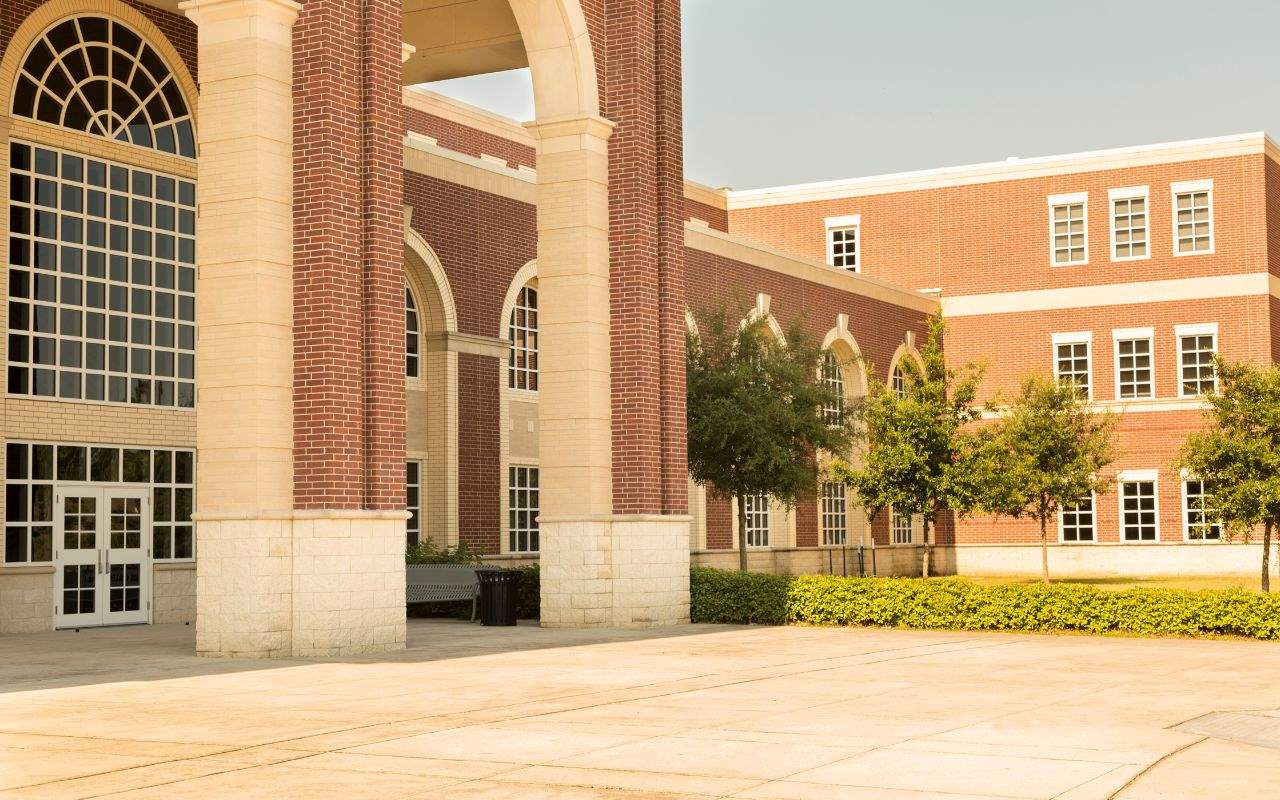
Having a few college prospects in your hands can be such a rush. Nothing compares to the feeling of having options and weighing them against your goals when it comes to getting a college education. You get the opportunity to do college tours and get the feel of each college campus. It's such an exhilarating time.
But the purpose of these college visits goes beyond seeing the physical attributes of a beautiful campus ; it allows you to immerse yourself in the college environment, interact with students, meet faculty and staff, and get a sense of whether the college aligns with your goals.
Let's go over the different roles a college tour plays in the eyes of prospective students and families.
The Role of College Visits in Decision Making
Statistics show that college visits play a huge role in shaping students' decisions. According to a survey conducted by the National Association for College Admission Counseling , 69% of students who visited a college campus before applying said that the visit strongly influenced their decision to attend .
This is because college visits provide a firsthand experience of the college's atmosphere, as well as campus architecture and attributes, helping students evaluate whether it's the right fit for them.
Imagine walking into the college's state-of-the-art library, with rows upon rows of books and study spaces filled with motivated and determined students . The smell of old books mixed with the sound of pages turning creates an ambiance that ignites your intellectual curiosity. You can envision yourself spending hours lost and focused on your research and study , surrounded by a community of like-minded individuals.
Get Matched to Thousands of Scholarships
Create your Bold.org profile to access thousands of exclusive scholarships, available only on Bold.org.
How College Visits Influence Your Perspective
But other than the physical aspects of campus, the campus visit allows you to fully explore the campus and experience what your future could look like . You get to stroll through the academic buildings and visit the dorms.
You get the chance to speak with current students and get their perspectives on campus life, which is always a plus. Interacting with students and faculty can give you insight into the campus culture, work-school balance, and support most high school students don't get.
When visiting campus, college tours also give you the chance to attend information sessions and meet with admissions counselors . These opportunities can help you understand the college's academic programs, majors, and extracurricular activities. You can learn about internship opportunities, study abroad programs, and research initiatives that can enhance your college experience and prepare you for your future career.
Ultimately, these college visits give you firsthand experiences that go beyond what can be described through websites. They provide a true impression of the college and its community, helping you make an informed decision about your educational journey.

But between an already hectic senior year and your real life happening, when is the right time to schedule campus tours? Here are two key factors to consider when planning your visits:
Consider Your High School Schedule
We admit that while there is no one-size-fits-all answer, it's generally recommended to start visiting colleges during your junior year of high school, even if you haven't been accepted to any schools yet. Scouting your top school choices early will give you a clearer understanding of which schools align with your academic and extracurricular goals.
You also want to make sure to visit colleges during the fall or spring , when classes are in session, so you can get a true sense of what college life is like, vs. summer when there are fewer students. During the spring break of your junior year, you will have completed a significant portion of your high school coursework, giving you a solid foundation to assess your academic strengths and interests. And fall begins a new chapter for many students. You can't go wrong with these peak seasons.
Check out these scholarships for high school seniors to help reduce college costs!
Aligning Visits with College Admission Cycles
The second factor to consider is the college admission cycle . Many colleges have specific open houses or designated visitation days for students and families to tour the campus. These days provide a more comprehensive view of the college and include opportunities to attend information sessions, meet with faculty, and engage in any campus activities being offered. Plan your campus visits accordingly to take advantage of these events.
Visiting colleges during their specified visitation days can also give you an advantage in the application process . Admissions officers tend to take note of students who have demonstrated a genuine interest in their school, and visiting during these events shows your commitment and enthusiasm.
As the ball starts rolling, preparing for your college visit becomes more and more exciting . It makes you one step closer to getting a firsthand experience of the campus and interacting with current students and faculty, so what should you do to prepare yourself? Let's go over some important steps to take before your college campus tours:
Researching Colleges Before Your Visit
Now, while touring different campuses is fun, it shouldn't be taken lightly or as a game. It is crucial to spend time researching colleges that interest you . Take your time to deep-dive into the various academic programs your chosen schools offer.
Look through their majors or areas of study that align with your interests and career goals. And explore the student organizations and extracurricular activities available to students on campus. These factors will give you a sense of the kind of campus life and opportunities you may have for personal growth and development.
Be sure to read about the college's mission and values , as well. It's important you understand the core principles and values that guide the institution toward academic success. It'll help you determine if the school is a good fit for you, too. Take note of unique features or programs a particular college might offer that stand out to you , like study abroad opportunities, undergraduate research opportunities, or internship programs.
Gathering this background knowledge will allow you to ask informed questions during your visit that demonstrate your genuine interest in the college. Again, don't forget admissions officers and faculty members appreciate students who have taken the time to familiarize themselves with the institution and its offerings. If you go to these tours prepared, you might leave a lasting impression that can help you in the future.
What to Bring on Your College Visit
As we said, it's important to go to campus tours prepared , and that isn't limited to research and/or mindset. It's important to keep in mind that you are going to have questions, and things will spring up that might take you by surprise, so having the right tools handy will make all the difference . Here are a few essential items to bring when visiting colleges:
- A notebook and pen : I know it sounds out of the ordinary, but we can assure you will come across various aspects of the college that catch your attention. Whether it's a unique program, a beautiful campus feature, or a piece of advice from a student, having a notebook and pen handy will allow you to jot down these observations and thoughts.
- Comfortable shoes : College campuses are often expansive, and you'll be doing a lot of walking during your visit. Comfort is key for an all-day tour. Make sure to wear comfortable shoes that will keep your feet happy throughout the day. This will allow you to focus on the experience rather than being distracted by uncomfortable footwear.
- A list of questions : Now, THIS is important. You will have questions for your admission officers, professors, and current students, and it's easy to forget them in the heat of the moment, so having a list of questions on hand will help keep you on track. You might even consider asking about the academic support services available, internship and career placement opportunities, campus resources, and the overall student experience. Don't be afraid to ask all the questions you have relative to your interests and goals, and then some!
By having these items with you, you will be able to engage in meaningful conversations, as well as take notes that will help you compare and contrast different colleges later on. By being well-prepared during your campus visit, you will be one step closer to finding the college that is the perfect match for you.
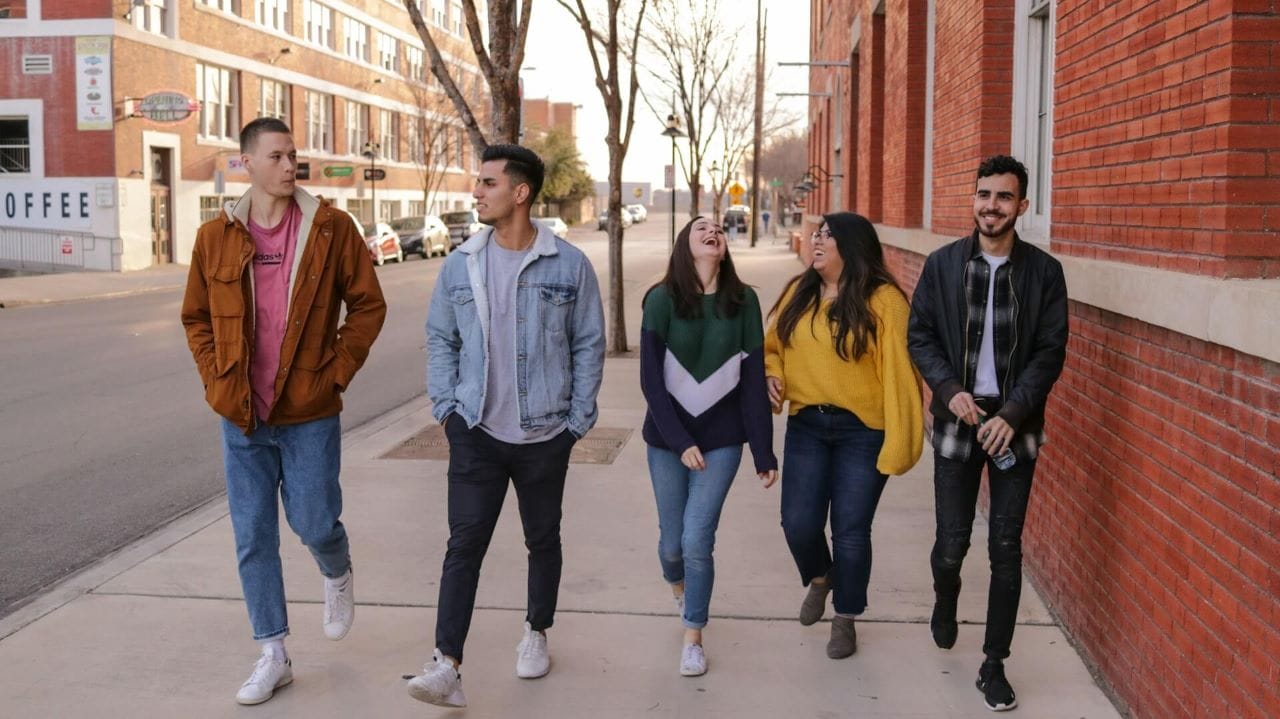
So, other than taking a tour around campus, what else can or should you do during your visit? Any and everything you can do ! Let's explore some key areas that will help you make the most of your college visit.
Key Areas to Explore During Your Visit
First, you want to make sure you start with a campus tour led by a student guide . Having an official student guide lead your tour will not only give you a chance to see the campus from the eyes of an already enrolled student, it will also give you a chance to get firsthand insight on campus life. Pay attention to all the little details others might ignore . You never know what might come in handy in the future.
You also want to soak in whatever facilities the campus offers . Take in all buildings on campus, like the library, research facilities , athletic facilities, dining hall, and any specialized spaces related to your intended major. Envision yourself working alongside professors and with fellow students on special projects or in student-led organizations.
Explore as much as you can from a student who knows the school . It's important to familiarize yourself with the campus as much as you can so you know where everything is. This will make your first day of class easy and stress-free.
And don't forget about the surrounding community . Explore the local community and its localities like restaurants and shops, even entertainment venues like malls and shopping strips. A thriving surrounding area can enhance your college experience beyond campus life .
Questions to Ask During Your College Visit
Asking questions during your visit is key to getting all the information you want and need. Ask about academic support services and internship opportunities. What's the availability of internships in your field of interest, and what partnerships with local businesses and organizations does the school have? Does the school offer campus community, clubs, and extracurricular activities that align with your interests? Gather as much information as possible so you can make an informed decision later on .
And don't forget about your future studies. Discuss academic support services and tutoring programs ; inquire about writing centers and seek academic advisors who can guide you throughout your college journey. These resources can provide valuable assistance in developing effective study strategies, improving your writing skills, and navigating the academic challenges that may arise during your time at college.
And lastly, financial aid and scholarships . We all know a college education can be pricey. Ask about the types of financial aid available, including scholarships, grants, and work-study opportunities. Ask about the application process and deadlines, as well as any specific requirements for merit-based scholarships . Ask everything you can and familiarize yourself with the financial resources available to you that can help you get the education you deserve.

Now that your college visits are over, it's time to prepare for the next step: the college transition . We know how intimidating heading to college can be, but don't worry. Here are some steps to take that can help you prepare for your college transition :
- Do more research and familiarize yourself with your chosen school
- Attend orientation
- Connect with current students or alumni
- Join meet-and-greets
- Read online forums about your chosen school
- Explore the campus
- Participate in first-day campus activities
- Find a good school-life balance
- Bring pieces of home with you (i.e., pictures, favorite blanket, decor, etc.)
- Set realistic expectations for yourself
- Keep in touch with friends and family
The list goes on, but most importantly, take it one day at a time. By following this guide, you'll be well-equipped to navigate the college visitation process and handle the transition to college. Remember, finding the right fit for you is essential for a successful and fulfilling college experience . So start planning your college visits today and embark on an exciting journey towards your future!
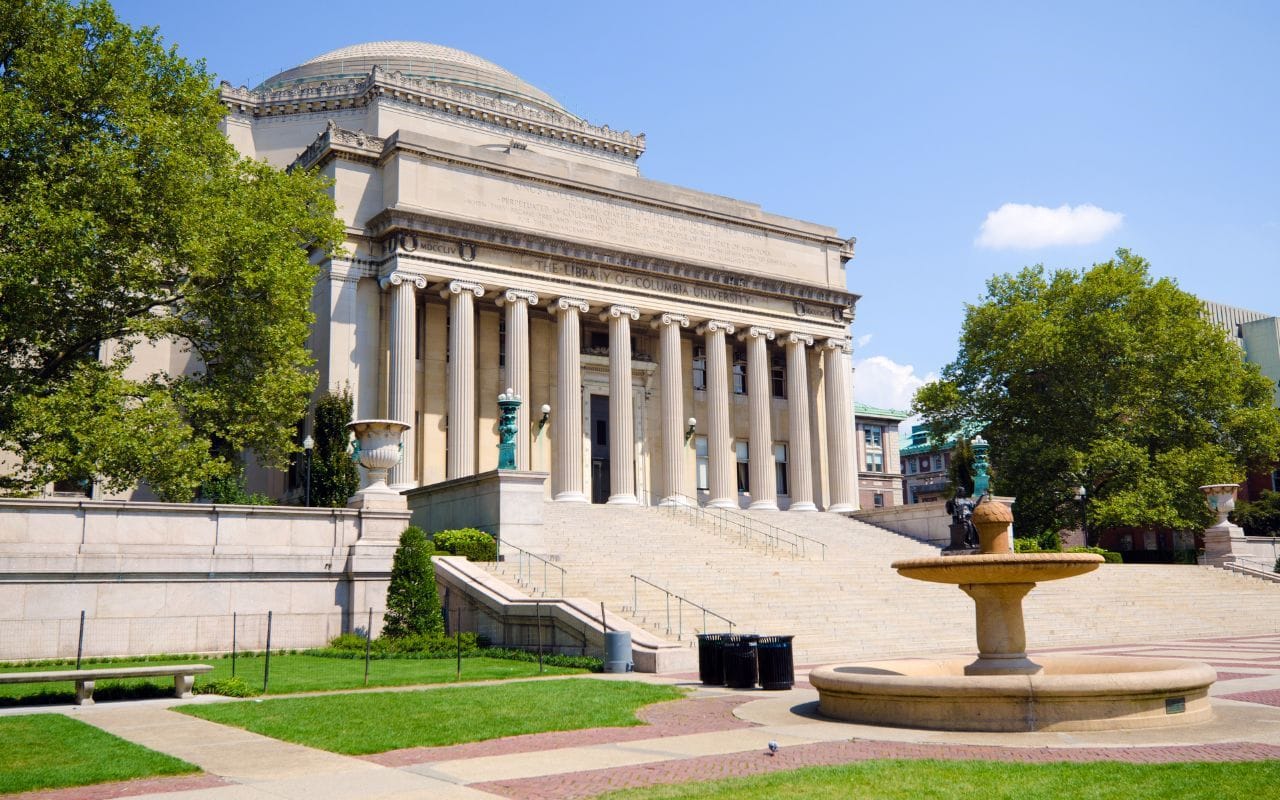
What are ways to prepare for a college visit?
College tours can be exciting. That's why we recommend being prepared for any and everything. Bring a pen and a notebook so you're able to keep track of important campus factors that stand out to you.
You can also have questions written down prior to your visit so you know what to ask. Keep in mind that you will be in for a day of walking around campus, so comfort is everything. Wearing shoes, like sneakers, will support your feet all day and keep you focused on your visit.
When is the right time to start visiting colleges?
While there is no "right time" to start visiting schools, we recommend scheduling campus tours during peak school seasons, spring and fall. With classes in full effect during these seasons, you will be able to get a fuller sense of what the campus is like, the kind of students who attend the school, and what everyday life is like there.
Of course, you can also visit during the summer, but since most students go home for the summer, campus life may not reflect its true nature.
What are the next steps after college campus visits?
The next steps after your campus visit are your preparation and transition to college. Do you do more research on your chosen school, join campus activities or meet-and-greets, talk to friends and family, express your concerns or excitement, read online forums about your chosen school, and when it's time to go, bring pieces of home with you to keep you comforted.
But more importantly, take it one day at a time. Remain focused and prepared, and you'll find yourself having the best college transition possible.
Have questions regarding your upcoming college journey? Visit our blog to read more about our college guides, scholarships , and ways to prepare yourself for your first year of college .
Be sure to sign up for a profile and apply for financial assistance today !
Related Posts
How to eat healthy in college, how to get college transcripts, what is a technical college.
Why Visit Colleges?
Find the right college for you..
A key part of deciding which college to go to is finding a good fit. And a great way to get more information is to visit the colleges in person.
Virtual tours are also a great way to learn more about a campus. It can help you determine whether a college is the right place for you and prepare you for a campus visit at your convenience.
A Firsthand View
Why are college visits important? A campus visit is your opportunity to get a firsthand view of a college. A college catalog, brochure, or website can only show you so much. To really get a feel for the college , you need to walk around the quad, sit in on a class, and visit the dorms.
Get Answers to Your Questions.
A visit also lets you talk to students, faculty, financial aid staff, and admissions officers. You can get answers to important questions like these:
- What’s the campus meal plan like? How is the food? What are the options?
- What's the social scene like? What kinds of activities are available?
- Is there plenty of dorm space or a housing crunch?
- How many students are commuters? How many are campus residents?
- Is there a health center? What mental health resources are available?
- What career development resources are available? What student employment opportunities are available?
Use this checklist for a campus visit to remind yourself of everything you want to do once you reach your destination.
Your family members can also participate in the visit and any information sessions. They can help you decide which colleges to apply to and which one to attend.
Benefits of a Campus Visit.
Visiting a college is a great starting point. Pick up any official college material you see on the campus tour, such as brochures and financial aid forms.
Don't forget to get business cards, too, so you'll have a real, live contact if you have a question about admissions or financial aid. Do college visits help with admissions? Yes, these visits allow you to speak to the admissions officer handling your application.
Student newspapers and activity calendars give you a sense of what campus life is really like. Check out bulletin boards to see what bands are coming to the campus, what parties are advertised, what internships are posted, and what the day-to-day energy of the place is like.
Get Ready to Decide.
It’s your decision. Heed your intuition. Do you feel comfortable walking around campus? Do you feel at home? Do you click with the students and faculty? Is this what you imagined college to be like? Spending time on campus helps you determine whether a college is a good fit.
Adapted from Campus Visits and College Interviews by Zola Dincin Schneider.
Related Articles

When Should High School Students Start Visiting Colleges?

- Post published:
- Post category: College
The high school years are so busy. And in the midst of activities and academics, we also need to engage in college in career planning . There are so many things to do and so many conflicting pieces of advice! I’m here to help answer the common question, “When should high school students visit colleges?”
When should high school students visit colleges? 5 Things to Consider
Understanding the college & career planning process.
First, it is important to note that visiting colleges is going to be of little use if you (or your child) have not already determined your future career path. It is important to spend time visiting colleges that have great programs for the career path you are wishing to pursue. By taking this approach , you will save yourself a lot of time and you’ll feel less overwhelmed when it comes to narrowing down your choices.
When should high school students visit colleges?
Is sophomore year too early to visit colleges.
If you (or your child) has determined a career plan with a good amount of confidence (80-90 percent sure), you are likely ready to begin visiting colleges as a sophomore. The benefit of starting early is you’ll have more time to thoroughly think through the decision, evaluate financial aid, and compare and contrast programs. Additionally, you’ll also be able to send college entrance testing results to the colleges of interest!
Is junior year too early to visit colleges?
Junior year is not too early to visit colleges. In fact, I think it is a perfect time. A student’s senior year is usually very busy. And many college applications are due in the fall of a student’s senior year. Students feel less stressed when they have a career and a first-choice college chosen when they begin their senior year. This allows for more intentional planning and less panicking!
What time of year is best to visit colleges?
It is best to visit colleges during the fall or spring semesters. Each college posts its academic calendar online. Make sure you are visiting when classes are in session and students are on campus. This will give you the best feel for the campus culture and you can request to sit in on a class in your program/major! This is a great way to maximize your time on a college visit.
What questions should you ask on a college visit?
I’m glad you are asking this question as it is a very important one! I have outlined my favorite questions to ask as well as steps to planning a great college visit in this guide ! Don’t miss these free resources as they are excellent guides that will save you loads of time.
In summary, when should high school students visit colleges?
As early as possible after determining a career path. Earlier is better. It gives you more time to prepare for great visits and evaluate your options. Informed decisions are always best, so download the “Questions to Ask on College Visits” guide to make the most of your time and visits!

Hello, and welcome to my blog!
I’m loren and i help students and parents with college and career planning.
As an experienced educator and career coach, I sit down with students and young professionals one-on-one and assist them as they articulate their goals and develop a plan to achieve them! The path to success is not straightforward. My mission is to help you experience true career fulfillment through proactive coaching and career planning.
Book a free consultation today !
Please Share This Share this content
- Opens in a new window
You Might Also Like
How to choose a major that is right for you.

Undeclared Major: Three Actions to Take

Winning Strategies for Writing a Student Athlete Resume

College tour season is about to kick off. Here are 10 tips from college tour guides to have a successful campus visit.
- As spring starts, colleges around the country welcome parents and students to campus for tours.
- College tour guides want people to arrive on time, ask the right questions, and have fun.
- They also recommend students take the tour on their own, without their parents.
Spring break is right around the corner, and for many high school students and their parents, that means many will be hitting the road to tour colleges around the country.
To make the most of your visit, Business Insider spoke with college students and tour guides. They know the campuses like the back of their hands, and they know how to walk backward.
Here are the dos and don'ts of college tours from student guides.
1. Get there with no time to spare, but don't be late
You won't get points for arriving early, so try to arrive on time. But if you do happen to arrive late , there's no need to worry.
"If something comes up and you are late, ask your guide what you missed once the tour finishes," Skyler Kawecki-Muonio, a senior at Sarah Lawrence College, told BI. "They will happily fill you in."

2. Dress to impress, but don't sacrifice comfort
It's important to look nice, but you don't have to don a jacket and tie. Tour-goers should put their best foot forward with a sturdy pair of walking shoes , and don't forget to dress for the weather.
"At Fairleigh Dickinson, tours go out rain or shine, so make sure to wear clothes that will keep you warm," Emily Bone, class of '25, said.
3. Don't forget to sign in, but skip the CV
Most schools have a check-in desk where you'll receive a campus map and other literature. But don't bother furnishing schools with your portfolio.
"Students can leave their resumes at home," Henry Millar, a senior at William & Mary, said. "Tour guides generally do not have any sway in the admissions process whatsoever, so feel free to save the paper."
4. Pay attention on the tour, but do it solo if possible
Some schools offer the option of letting parents and kids take separate tours, which has advantages.
"Get excited about your child's potential future in college, but give them some space to see what they think of that school on their own," Nathan Weisbrod, a junior at Wesleyan University, told BI.
Students can comfortably ask questions without a parent present and compare notes afterward.
5. Ask all your questions, but avoid personal interrogations
This is the time to inquire about any aspect of campus life , and don't feel shy about speaking up.
"Tour guides love getting questions because it allows us to cater the tour, especially in small groups, toward the needs and interests of the families on that specific tour," Halle Spataro, class of '24 at Bucknell University, said.
But some topics are off-limits, so don't ask your tour guide about their SAT/ACT scores or what they wrote about in their essay.
6. Speak up, but let the student take the lead
Parents may be tempted to raise their hand again and again, but this tour is about the student, so there should be space to let them shine.
"Try to take the backseat — or the passenger seat — but refrain from driving all of your child's interactions," Julian Jacklin, class of '25 at Reed College, said. "Students who feel they can own that experience usually ask the most questions and engage with the tour more."
7. Say thanks, but don't leave with questions unanswered
Maybe your guide didn't hear you, or your kid was reluctant to speak up. You can still get the information you want before leaving.
"There's a lot of information students are getting that day and a lot of excitement with being in a new place, which can make people forget to ask certain questions," Lorenzo Mars, a junior at Pepperdine University, said.
Therefore, get your tour guide's email address so that you can follow up afterward.
8. You may know exactly what school is right, but keep an open mind
Don't be surprised if a city-living kid is suddenly intrigued by a small-town setting.
"The college search and college experience are all about getting to know yourself better and growing, so on a tour, students have to trust themselves and their judgment of the 'world' they've just stepped into," Thomas Elias, class of '24 at University of Scranton, said.
9. Take in as much as you can, but remember to have fun
Sure, preparing for the next four years can be scary and stressful. But it's also an exciting milestone, so enjoy the ride.
"These tours serve as great opportunities to learn more about colleges — along with their cities, culture, and people," Connor Gee, a sophomore at the University of Mississippi, said. "Have fun with it!"
10. Weigh the pros and cons of the school, but don't stop there
Your tour may be over, but you can still learn other ways to immerse yourself in college life .
"See if the school offers additional experiences, like eating in the cafeteria or attending a class," Emily Balda, class of '24 at Seton Hall University, said. "Consider it 'food for thought.'"
If you enjoyed this story, be sure to follow Business Insider on Microsoft Start.
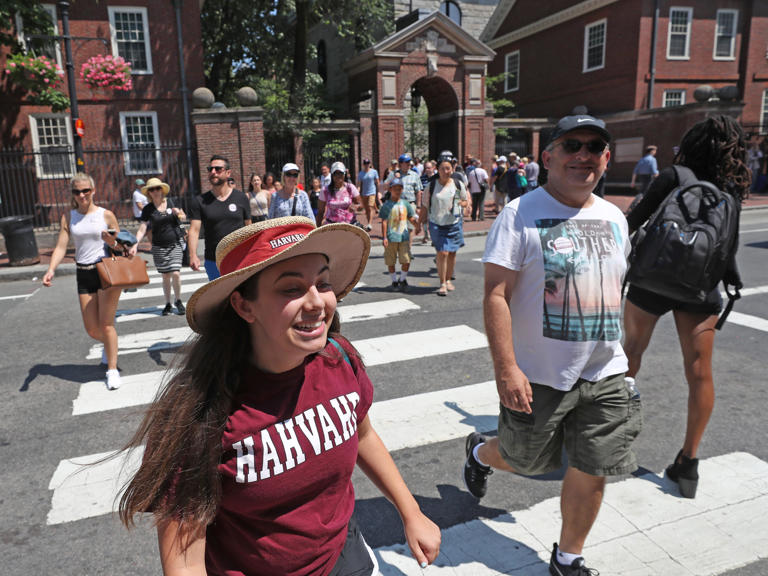
- About College Counselor Services
- 50 Great Schools Where High School Students Can Get College Credit
When Should High School Students Start Visiting Colleges?
Visiting colleges is a rite of passage for high school students today. While you can look at images online, go over college catalogs and even pour over the materials that those schools send you, nothing beats seeing the campus for yourself. That visit lets you see the type of students attending the school, try out the food in the cafeterias and even sit in on a few classes. The best time to start visiting those colleges is when you start your search for the best school.
Types of College Visits
There are two different types of campus visits that you can do today. The first is a more basic visit that lets you take a tour of the campus with a student who also acts as your tour guide. Tour guides are generally knowledgeable about the campus and can answer any questions you have, including the best cafeterias, the average test scores of applicants and clubs and activities available on campus. Many colleges offer overnight visits as well. You can actually spend a night in a dorm room on campus with real students and follow them around for an entire day.
When to Visit
Ryan Lytle of U.S. News & World Report recommends that you start visiting campuses early in your high school career. Though some students wait until their senior years, Lytle points out that seniors have busy schedules and may not have enough time available to take a full tour. Some suggest taking tours while on family vacations in the summer, but many colleges have fewer students taking classes in the summer and may not have as many events or activities taking place too. You generally want to plan a tour during your freshmen, sophomore or junior year and tour campuses during the fall or spring semester.
Related: How Many Colleges Should I Visit Before Applying?
What to Look for
Visiting colleges gives you the chance to see how well you fit in on each campus. You should take the time to sit in on at least one class, especially if you already know what you want to major in when you go to college. Take the time to speak with students on campus too. Find out why they chose that campus, what they like best about the school and what they like to do after their classes. You may also want to talk with some of the professors working on campus, stop by a few of the activities you want to do and check out the recreation centers.
Virtual Tours
Taking a campus tour isn’t always possible. You might live hours or thousands of miles away from the school you want to attend. That is why a large number of colleges now offer virtual tours online. With just a few clicks of your mouse, you can take a complete tour of that campus. You’ll see what the students look like, where they like to hang out and even the interiors and exteriors of main buildings on campus. Virtual tours are available every day of the week too and are tours you can take as a freshman or a senior.
You should never enroll in college without first taking a tour of that campus. Visiting colleges is something you should do during your senior year or earlier, but you can also take virtual campus tours now as well.
Featured Articles
Frequently asked questions about higher education.
College Visits: Do's, Don'ts for Parents
Be alert without smothering, help take notes and ask questions that prompt reflection.
College Visits: Do's, Don'ts for Parents

Getty Images
Parents should assist their child on campus visits without micromanaging or projecting their own wishes.
It is common and even expected that parents be part of visits to their children’s prospective colleges . After all, someone needs to book the trip, be a chaperone for overnight visits and more.
But how involved should parents be in activities once everyone arrives on campus? Here is a short list of what parents should and should not do during college visits.
Don’t Micromanage
If your child will be going away to college, he or she will soon have to do many things independently. Everyday tasks like laundry, meal prep and cleaning up, which you and your family may still assist with, will soon be the sole responsibility of the student. Factor in the more demanding academic rigors of college, and you realize your child will soon have a lot more on his or her plate than before.
If you have always been extremely involved in your child’s life, it is time to let go of the reins so that your child is more psychologically prepared when the first day of college arrives. Start by letting your child make decisions about college visits, such as when to travel and which campus tour to sign up for. This way, your child will have a better feeling about the visit.
Don’t Project Your Wishes
College visits can be as exciting for parents as they are for students. You may be eager for your child to consider certain features of the campus or advise him or her based on what would be important to you as a college student.
However, this can be frustrating to high schoolers whose personalities and interests differ from yours. For instance, you may urge your child to get a sense of campus culture by attending a football game, yet your child may be more interested in seeing the libraries and study spaces.
It is best to avoid living vicariously through your child. Instead, put yourself in your child’s shoes and let him or her decide what is worth doing during the visit.
Keep Detailed Notes
Campus visits are characterized by stimulation and novelty; everyone sees and experiences a great deal in a short time. With all the excitement, you may not think to take notes, or you may trust yourself to remember the visit well. However, this would be a mistake, as you and your child are bound to forget the finer details, especially if you tour various colleges in a row.
As such, it is highly recommended that you and your student take handwritten or electronic notes. You could even volunteer to be the “scribe,” so the endeavor feels like less of a burden for your child.
For each visit, you could maintain a chart with categories for your child's observations, such as “What I Liked,” “What I Didn’t Like” and “What I’m Unsure About.” Alternatively, you could agree to rank different aspects of the college dining options, student body diversity , closeness of lecture halls, etc. on a numeric or star scale.
It is equally important to reflect on these areas again once the visit is over and the dust has settled, giving everyone more clarity. Your child may realize that a category that initially seemed important while on campus is no longer a top priority.
Ask Questions That Prompt Reflection
If you think it is important that your child consider certain aspects of the campus, but you want to avoid sounding bossy, ask questions that prompt reflection.
For instance, you might say, “Should we go look at the fitness center in case you start working out?” or “Would it be a good idea to visit the science labs, since you’ll probably be spending a lot of time there?” Such questions can guide your child indirectly without giving the impression that you are exerting your will.
Be Alert Without Smothering
During a campus visit, your child might want to spend some time on his or her own, and it is important that you let that happen within reason. Alone time can give your child a chance to make friends on campus and get more acquainted with the college culture.
To this end, be attentive without smothering your child. For instance, you can agree to meet up after a certain hour or schedule check-in calls to make sure everything is okay. Again, the point is to give your child a healthy taste of the independence he or she is on the brink of having.
14 Tips for an Effective College Visit

About College Admissions Playbook
Stressed about getting into college? College Admissions Playbook, authored by Varsity Tutors , offers prospective college students advice on Advanced Placement and International Baccalaureate courses, SAT and ACT exams and the college application process. Varsity Tutors, an advertiser with U.S. News & World Report, is a live learning platform that connects students with personalized instruction to accelerate academic achievement. The company's end-to-end offerings also include mobile learning apps, online learning environments and other tutoring and test prep-focused technologies. Got a question? Email [email protected] .
Ask an Alum: Making the Most Out of College
You May Also Like
Today naia, tomorrow title ix.
Lauren Camera April 9, 2024

Grad School Housing Options
Anayat Durrani April 9, 2024

How to Decide if an MBA Is Worth it
Sarah Wood March 27, 2024

What to Wear to a Graduation
LaMont Jones, Jr. March 27, 2024

FAFSA Delays Alarm Families, Colleges
Sarah Wood March 25, 2024

Help Your Teen With the College Decision
Anayat Durrani March 25, 2024

Toward Semiconductor Gender Equity
Alexis McKittrick March 22, 2024

March Madness in the Classroom
Cole Claybourn March 21, 2024

20 Lower-Cost Online Private Colleges
Sarah Wood March 21, 2024

How to Choose a Microcredential
Sarah Wood March 20, 2024


When Should You Start Visiting Colleges?
Visiting colleges is a really important piece of your college journey. You want to get a true feel for the school’s personality, and stepping foot on campus will help you do just that. There is no hard and fast answer as to when you should start visiting colleges. You can start as early as your freshman year of high school and continue visits into your senior year. Because junior year is such a busy year, we recommend that if you haven’t already started, that you begin visiting colleges at the end of sophomore year or the summer before junior year.
When It Comes to Campus Tours, the Earlier You Start, the Less Stressed You Will Be
In junior year, time quickly gets away from you – especially if you play sports. So start your research, make your list of schools, and schedule those college visits early. Research colleges online and make a list of schools that interest you based on majors, size, location, school spirit and more. Our article What to Look for When Searching for Colleges can help you get started.
In 9th grade you can certainly dabble in college visits. In 10th grade, you should definitely jump in and start taking tours and signing up for information sessions. It is important to get a flavor for what it is like to be on a college campus and what to look for – and the earlier the better. This will give you an opportunity to really cast a wide net, then narrow down your college search so you can find schools that fit you best.
And, by getting this head start early, you will be less stressed when it comes time for completing those college applications. You will have an idea of what you like and don’t like about the schools you were interested in. And, you may even have more time available to visit those on the top of your list a second time.
Fit in Visits in Your Spare Time
Free weekends, school vacations and holidays are the perfect time to schedule a college visit. If there are colleges in your local area, start there. When taking a trip or heading to a sport tournament, see if there are any colleges on the way or in the area where you are staying and fit in a tour. Some families even like to schedule their vacation time around schools they want to visit.
By 10th grade and early into your junior year, visiting schools starts to get a lot more serious. So I would definitely suggest during your sophomore year, and certainly the second half of your sophomore year, to start visiting schools, continuing to do so into your junior and ultimately your senior year. I always say, don’t put off until tomorrow what you can do today – and that applies to college visits.
Looking for help with the college search and application process?
Looking for help with the college search and application process? We help students and families through the entire college planning journey – from search , applications and essays to interview prep , financial aid consultation and final school selection .
Contact us at info@signaturecollegecounseling.com or by phone, 845.551.6946. We work with students through Zoom, over the phone, and by email.
We are Growing - Awesome Team Players Wanted!
- What to Expect
- Health and Safety
- Travel Confidently
- Our Response to Covid-19
- Testimonials
- Registration & Payments
- Fundraising
- Register Now
- Parent-Led Trips
- Share Your Trip
3 Reasons High School Students Should Take a College Tour

A school trip is an incredible growth opportunity for your students, both emotionally and educationally! Recently, more teachers have asked about adding a college tour to their travel experience. Regardless of your destination city, there will likely be several colleges and universities that your students can visit.
Here are three reasons you should add college tours for high school students to your next school trip itinerary.
Perfect Timing
Many parents wonder when to start college visits with their children. According to an article in Forbes , students should begin researching potential colleges and universities during their sophomore year of high school. High school is when many students do a lot of emotional and personal development, and they may finally be considering the question, “What do I want to do with the rest of my life?” A school trip for high school students is a great time to visit college campuses to glimpse what life could be like a few years in the future.
We tend to agree with Forbes that proper college visits should probably wait until students are in the second half of high school. However, that doesn’t mean that younger students can’t benefit from visiting college campuses too! Even 8th graders can imagine what life may be like when they travel to university, but they may not need an official campus tour.
Student Independence
Many students visit colleges and universities with their parents, which is an incredible opportunity! But sometimes, parents may be the ones asking more questions. College tours for high school students should be about the students looking to attend university. Traveling with a group of peers, students may be more comfortable asking their own questions. It may also make it easier for them to visualize themselves attending college on their own.
Aside from that, many parents cannot travel with their students to visit colleges. Adding on a college visit during your already scheduled school trip gives those students an opportunity that they may not have been available before. If you’re worried your students may be overwhelmed or nervous while visiting colleges, create a college visit checklist that highlights the topics they are most interested in, like campus organizations, majors, and scholarship opportunities.
Experience the City
One thing most students forget to consider about their college experience is where the college is located. Just because you’re in school doesn’t mean you’ll always be in class! The university’s location can have a big impact on the student’s decision to study there. On a school trip, students will get a small taste of what it’s like to be a local in the city. So, while they’re getting exposed to a college campus, they also get to see what the surrounding area feels like.
If students have spent their entire life living in a small town, going to college in a city like Washington, DC , or New York City may be overwhelming. But by allowing them to visit the city and college in one trip, students can get an idea of what to expect should they choose to study there in the future.
Where Should We Go?
Looking for inspiration for college tours for high school students? Any destination you visit will have colleges and universities for your students to tour, but here are a few destinations we have found are a great fit for high school student tours.
- Washington, DC, & Virginia – Four days visiting colleges like Georgetown University, University of Virginia, and William & Mary. Customize this itinerary to include stops around our nation’s capital and Colonial Virginia.
- Georgia – Four days in Atlanta focused on some of the best universities and colleges in Georgia. This itinerary can easily be combined with a Civil Rights Tour .
- New York City – Whether your students are looking for a career in fashion or technology, New York City has dozens of world-class universities to explore. Spend extra time in the Big Apple experiencing all the city offers.
- New York State – If you’re not interested in the hustle and bustle of the city, touring colleges in New York State is another great option. Wrap in a trip to Niagra Falls while visiting universities near the Canadian border.
When you’re ready to start planning a college tour for high school students, check out our College Prep programs to fully customize your tour experience. Or, reach out to one of our Student Travel Consultants to start today!
Related Blog Posts
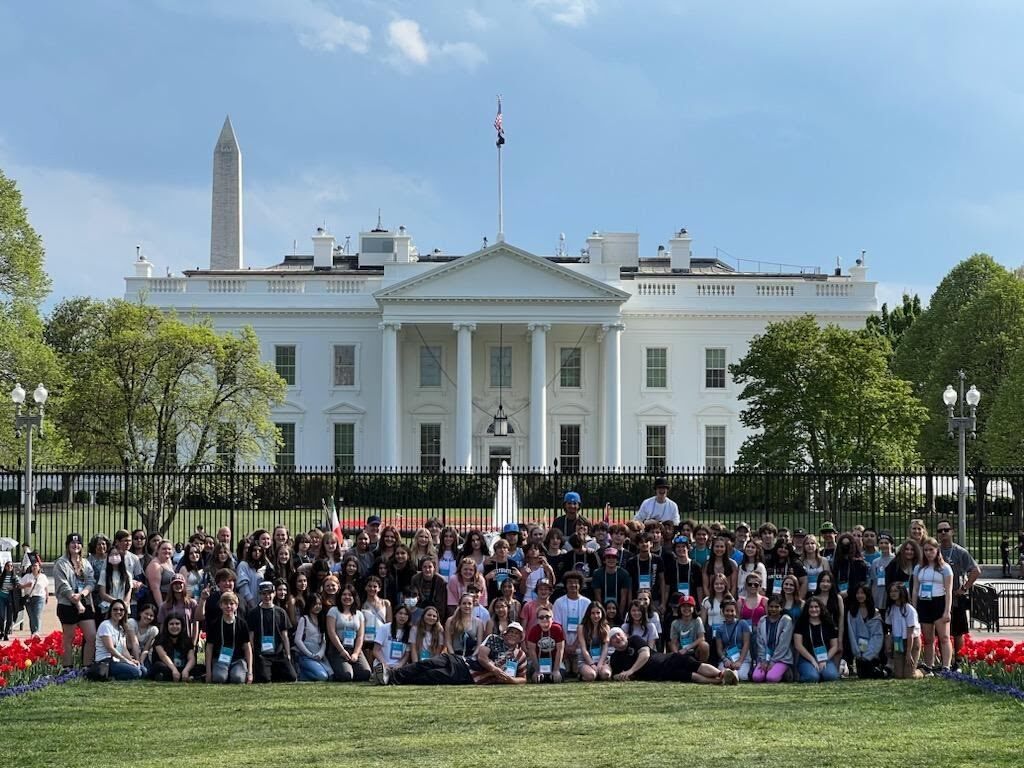
Why Proper Behavior and Decorum Are Important in Student Travel
March 22, 2024

5 Things You’ll Love About Leading a Student Tour
February 16, 2024

25 Virtual College Tours Worth Taking
Virtual college tours are considered one of the easiest, most accessible ways to learn about a school. While a more typical college tour may still be conducted in-person, the reality of that is changing. With the technological advances of the last 10-15 years, virtual tours have become a new, affordable possibility. Indeed, a virtual college tour can be an excellent way to learn about a school’s campus, programs, student life, clubs and activities, and much more.
You might be curious, how exactly do virtual college tours work? The answer depends on the school. Some virtual tours are live streams or recordings of in-person campus tours. Others are interactive maps where you can click on buildings and see what happens inside. Some will even include Q&A sessions with students. These are just some of the many ways schools show prospective students what life is like on campus. However, not all virtual college tours are created equal.
In this article, we’ll explore the world of virtual college visits, including:
- Benefits of engaging in college tours
- Similarities and differences between in-person and virtual college tours
- Different formats of virtual tours
- Top 25 virtual tours worth taking
- How to plan and make the most of your college visits
- What comes next after a college tour
Without a doubt, college visits will play an integral role in your college journey. So, let’s dive into why college visits are so important to the application process.
Why College Visits?

Before we explore virtual college tours in greater detail, let’s discuss why college visits are important to begin with. First and foremost, college tours are a way to learn about schools before you apply or even attend. Attending college is a big commitment. Therefore, taking the time to learn more about each school will allow you to feel more confident in deciding where to attend.
Secondly, the college admissions process is a time of self-exploration. By engaging in college tours, you can learn more about yourself just as you do about colleges. Maybe you will notice you like smaller campuses that aren’t in bustling cities. Or perhaps you will realize that having a lot of cultural diversity on campus is important. By learning these facts about yourself, you will contribute to your overall personal development as well as create a holistic college list.
Lastly, college visits for juniors help to put together a strong application. Many colleges request that you write a supplemental essay about why you want to attend their school. Through a visit, you can gain knowledge about the school and be able to speak passionately and specifically about why you wish to attend in your essays. This is more critical than ever since the number of applications has skyrocketed at many schools. As such, you’ll need to make sure your application demonstrates why you are a clear fit.
College visits and the admissions process
As you may have already gathered, there are two times when you might find it most valuable to visit colleges:
Before applying
Virtual college tours and in-person campus tours can help you narrow down your college list. In doing so, you will only spend money and time applying to colleges that you would really love to attend. College visits for juniors can also help them write stronger essays.
After admission to make a final matriculation decision
If you are admitted to multiple schools, a campus visit can help you feel more confident in your final decision. As a senior, you also might have more specific questions about certain activities or campus life. Getting to know the campus more can also help ease the transition into your first year. Since you’ll already know where important buildings and resources are located, your first day may not be as overwhelming!
Now that you understand the importance of college visits, let’s explore what goes into planning a college visit.
Planning your college visit
As we shared, college visits are an important part of the admissions process. However, planning in-person campus tours can be time-consuming and expensive. To begin, you and your family will need to explore what times of year are best to travel. Some common times to visit schools are during school breaks or summer vacations. However, if you hope to see more activity on campus, then try to plan your visit when classes are in session.
Next, we recommend setting up a visit with the admissions office. While you can, in most cases, visit a campus without an appointment, the appointment helps you gain access to a tour. It may even allow you to speak with an admissions officer. Ideally, you will book this appointment a few months before the visit. If you find yourself running short on time, you can also show up on campus and take a self-guided tour. Occidental College , Haverford College , and Claremont McKenna College all offer self-guided tours, whether using a printed map or a downloadable app.
The cost of college visits
Regardless of whether you pre-schedule your visit, you will need to pay for your travel including transportation, hotels, and meals. Many students try to see multiple schools in one visit to save money and time.
For some students, setting up in-person visits is difficult. Beyond the expensive nature of travel, parents or guardians may not be able to take off work or find childcare. Some high schools organize college visits for juniors, or even sophomores, where adult chaperones take large groups of students to visit schools. However, this may not be an option at your school.
If the cost and logistics required to attend in-person college tours is prohibitive, don’t worry! In the next sections, we’ll discuss the many similarities, as well as the unique benefits, of virtual college tours.
COVID-19’s Impact on College Visits

While virtual tours existed pre-pandemic, the COVID-19 pandemic made them a necessity as college campus tours were canceled. Since then, virtual tours have become more advanced and more widely available. In some cases, college virtual tours can offer as much, or more, than an in-person campus visit.
While many students still prefer in-person visits, virtual tours can be used as a tool to explore colleges earlier in the application journey. Virtual tours can also be useful to prepare for an in-person visit. If a student can spend 15 minutes taking a virtual tour and noting what buildings or parts of campus interest them most, then they can focus their in-person tour on those aspects.
Overall, virtual tours are an excellent way to visit schools that are completely inaccessible, such as ones that are too far away. Many international students use virtual college tours to explore campuses they wish to attend. Indeed, the fact that virtual tours exploded during the pandemic has raised several questions about accessibility, including the need to make more tours available in multiple languages or geared towards low-income families.
Coming up, we will explore more about the similarities and differences between in-person and virtual college tours.
In-person vs Virtual College Tours

Luckily, visiting colleges today does not require you to go to a campus. Indeed, the number and quality of virtual campus tours for students have skyrocketed in recent years. Undoubtedly, there are similarities and differences between in-person college campus tours and virtual college tours.
Similarities between In-Person College Campus Tours and Virtual College Tours
- They provide a layout of the campus.
- They allow students to get a sense of the campus architecture, including the inside of academic buildings and dorms. For example, UT San Antonio offers special housing tours for students to see where they might be living.
- Students can learn about specific academic programs. For instance, Harvard offers a specialized in-person tour for engineering and applied sciences students in addition to the Harvard virtual tour.
- They offer insight into student life on campus. Emerson College , for example, offers videos of students talking about their transition to life in Boston and co-curricular activities.
- Tours allow students to explore the available clubs and activities on campus.
- They are opportunities to hear directly from actual students about their experiences. Colgate , Princeton , and Barnard all offer virtual conversations with students.
- Students can get some of their doubts answered. Many tours offer a live Q&A with current students. Pomona ’s live virtual sessions include this offering.
Differences between In-Person College Campus Tours and Virtual College Tours
Note that depending on the school, you may or may not receive information about that school’s admissions process during a tour, whether in-person or virtual. Several schools, like Spelman , encourage students to schedule separate webinars to learn more about the admissions process, as this is not a topic covered in their campus tours.
Now that we have explored the similarities and differences between in-person college campus tours and virtual college visits, let’s look more deeply into when and how to use virtual college tours.
Understanding Virtual College Tours
When first hearing about virtual college visits, many students and families are skeptical about how useful they can be. However, college virtual tours have advanced so much in recent years that many offer a similar, if not enhanced, experience to an in-person visit.
As we discussed, there are several obvious reasons why college virtual tours are easier than in-person, including the fact that they are free and require little to no planning. In the following sections, we will discover more of the benefits and uses of virtual college tours. We will also discuss how they work and explore some of the best virtual college tours that exist today.
Are Virtual College Tours Worth It?

Yes—college virtual tours are absolutely worth your time! Indeed, virtual college tours can be a very good investment of time depending on where you are in your college admissions process. Let’s explore some ways that you can use virtual college visits to aid you in your college decision-making process:
Initial exploration of schools
As a freshman or sophomore in high school, you might not know how to prepare for the college process. Using virtual college tours, you can begin to explore schools and learn about what you like and don’t like in a college. This process can help you stay motivated to work hard as you will visualize your goals with greater clarity. You will also begin to learn what types of schools you are drawn to, which can help you build a college list faster in your junior year.
Exploring more and different schools
In the past, many students were limited to only visiting schools they could travel to. In some cases, leaving their state or country was impossible. Virtual college tours offer much more accessibility for students who cannot travel large distances. Also, since they can be completed in much less time than in-person college campus tours, virtual college visits may allow you to explore schools you had never considered. Perhaps you were only considering applying to big public schools. With virtual college visits, you can branch out and easily explore small, liberal arts colleges as well.
Narrowing down the list of schools you might want to visit in person
You might have a long college list. Ideally, you’ll want to cut it down when considering which schools to visit. This is where virtual college visits offer a unique opportunity to make the most of your time and resources. Before you get on the road, you can do a virtual tour to see if you like the campus enough to visit. Or perhaps the virtual tour helps you see which parts of campus you want to explore further, or which buildings you want to enter.
Alternatively, maybe your virtual college visits give you the confidence to know you like the school enough that you don’t need to spend lots of money on a flight in your junior year. Perhaps you will wait and see if you are admitted and visit the school afterward to decide if you want to attend.
Certainly, we can agree there are many benefits to virtual college visits. However, some virtual college tours are more interactive, engaging, and informative than others. Later, we will explore some of the virtual college tours that are worth taking.
While the quality of the tour may depend on the schools you’re interested in, how much you get out of them ultimately depends on you. We will explore how to make the most of your college virtual tours later.
What Are Virtual College Tours Like?

Now that we have convinced you that college virtual tours are beneficial, let’s look at what you can expect from them. Most virtual college tours for students have some combination of the following offerings:
Guided tour of campus
This can include a combination of interactive maps and pictures, embedded videos, informational text, and voiceovers describing what you are seeing. Some college virtual tours offer 360-degree views that allow you to click around and move through campus as if you were there, such as the University of Tampa ’s tour. Even more advanced tours offer immersive virtual reality (VR) technology which allows you to put on a headset and bring the campus to life in front of your eyes. However, VR campus tours typically require you to have your own equipment at home.
Campus highlights
Most virtual college tours for students will highlight important buildings or landmarks. These can include academic buildings, monuments, libraries, dining halls, residence halls, and the student union. By showing you these buildings, schools hope to give you a sense of what your day-to-day life may look like as a student there.
Student testimonials
Another helpful part of college virtual tours is student testimonials. Sometimes, this looks like students leading a campus tour while sharing their own experiences. Other times, schools will offer webinars for prospective students to ask questions of others. More common these days is the use of social media to share student experiences. Some schools will allow students to “take over” their social media accounts and post about their day so that prospective students can see what a day on campus is like. Consider following schools of interest on social media so you can get an insider’s perspective.
Now that you know what you can generally expect from college virtual tours, let’s explore the differences between college campus tours across schools.
How Do Virtual College Tours Work?

As the name suggests, virtual tours happen via a computer, phone, or other piece of technology. However, that can look very different depending on the school you are investigating. As we shared above, many virtual college tours for students include some kind of guided tour of campus, a list of highlights, and student testimonials. However, these items can come in very different formats.
Here are some of the formats you can expect:
Pre-recorded videos.
These can look like videos of a student giving a tour or a video of activities happening around campus. Since these are the simplest version of virtual college tours for students, they are the most common. Schools like Dartmouth , CalPoly , and Vassar all offer pre-recorded tours.
Interactive videos
Some videos let you click on buildings or landmarks as you watch to learn more. In some cases, you can even enter buildings. For example, the Harvard virtual tour lets you click through photos of the athletic center, dorms, libraries, labs, and quads. The Harvard virtual tour also includes a voiceover that provides additional information as you scroll through images.
Interactive map s
Here you’ll have a map of campus, whether flat or 360 degrees, that lets you click on landmarks to gather more information. Cornell , Bucknell , Wesleyan , and Pace all have online maps you can explore.
Live streams
This is a video that is being filmed at the same time you are watching it. Live streams sometimes offer a chance for Q&A with the student hosting. To take advantage of this, you will need to be present at the exact time the live stream is being shared. In some cases, you may need to register ahead of time to receive the link. An example of a live tour is at the University of Pennsylvania , where students register ahead of time for a one-hour, live, student-led virtual campus tour.
Live Virtual Tour vs. Pre-Recorded Tour
Take special note of the distinction between live virtual tours and pre-recorded virtual tours. Live virtual tours are being streamed as you watch them, which means you will get a better sense of what is happening right then and there on campus. Sometimes, live virtual tours include a Q&A section where you can ask questions. Meanwhile, pre-recorded virtual tours are less interactive but offer the flexibility of watching them whenever you can.
A common platform for many of these virtual college tours is YouVisit . YouVisit specializes in making virtual experiences as interactive as possible. For that reason, you may notice that many of the online virtual college tours you discover are similar in format. YouVisit’s tours tend to include interactive 360-degree maps, voiceovers, videos, and photos.
As you can tell, there are many formats and options for virtual tours. Indeed, the menu of options has exploded in recent years, in part due to the necessity created by the COVID-19 pandemic. Next, we will look more closely at when to take a virtual tour and explore some of the most helpful virtual tours worth taking.
When is the right time to take a Virtual Tour?

Virtual college tours can be useful at any stage, whether you’re already working on applications or just starting to build your college list. No matter where you are in the college admissions process, remember: it’s never too early to take a virtual tour! However, before you start exploring virtually, it’s useful to know how virtual college tours can benefit you.
Tours for sophomores, juniors, and seniors
Virtual college tours will look different for sophomores, juniors, and seniors. As a sophomore, a virtual tour might be a way to dip your toes into the world of college admissions. Since you can take virtual college tours from the comfort of your own home, this is a low-stakes way to get a feel for which colleges you’re interested in applying to.
College visits for juniors are a bit more meaningful. You may be starting to create a college list, so you’ll want to pay close attention to the different parts of the virtual tour. Consider taking notes as you go, so that when you start applying to schools you have observations from your virtual tour to look back on.
If you’re a senior, there’s another important aspect of virtual college tours to keep in mind: demonstrated interest. When colleges read your application, they often look for “demonstrated interest,” which is a way that you demonstrate that you care about the school. Colleges want to admit students who will ultimately choose that college, and one way to show that you care about a school is to attend a tour.
What Colleges Offer Virtual Tours?
In general, virtual college tours make tours accessible for people who can’t travel to the school for whatever reason. Most schools understand that not all students can visit in person and will offer some type of virtual tour—whether it’s a recorded tour, a video of the campus, or another interactive option.
So, how do you decide which ones to take? Up next, you’ll find our list of the best virtual college tours that we think are worth your time.
25 Virtual College Tours Worth Taking!
As we’ve discussed, virtual tours are a great way to get a feel for a school’s campus without having to make the trip to visit. You can take a virtual tour at almost any time—you can even take one more than once!
With that in mind, we’ve compiled a list of 25 great virtual college tours that you can embark on in lieu of a traditional college visit.
Top 25 Virtual College Tours
1. princeton university.
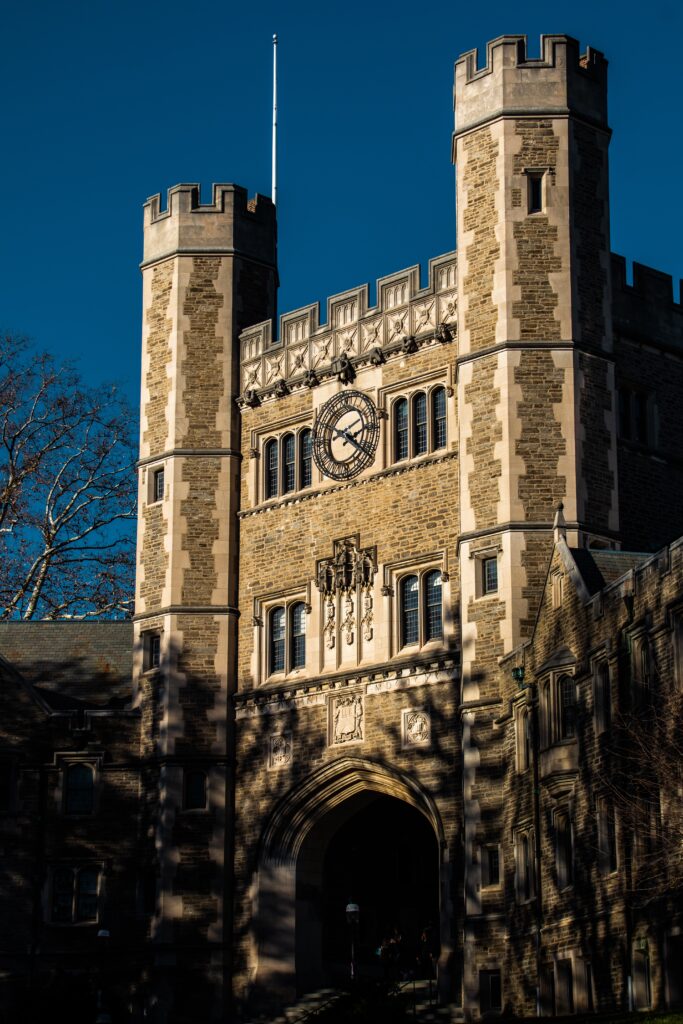
First on our list of virtual college tours worth taking is Princeton University. Located in Princeton, New Jersey, Princeton is ranked #1 in National Universities. Princeton’s virtual tour consists of a live-streamed Zoom webinar, where one of their tour guides will take you along with them on their campus tour. You can even ask your guide questions in the Zoom chat!
2. Harvard University
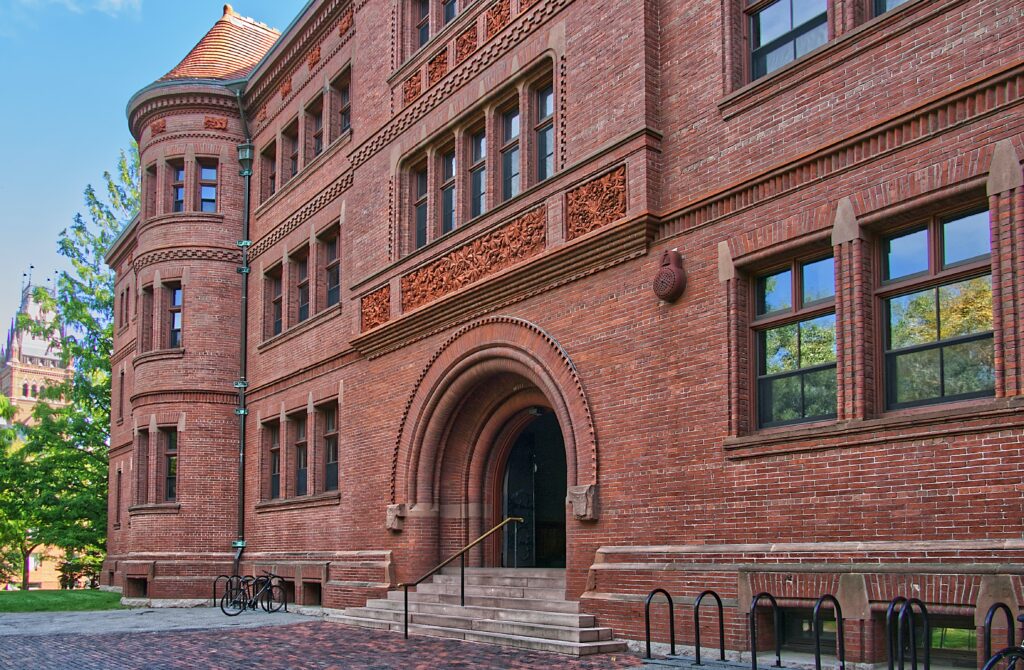
Next on our list of best virtual college tours is Harvard University, located in Cambridge, MA. The Harvard virtual tour is self-guided, meaning that you can click around the Harvard virtual tour to see panoramic views of Harvard’s classic New England campus at your own pace. Plus, if you’re interested in Harvard’s School of Engineering and Applied Sciences, there’s a separate Harvard virtual tour that goes into even more detail on that school’s offerings.
3. University of Pennsylvania

If you’re interested in UPenn but can’t make it out to Philadelphia, you can explore UPenn’s campus with virtual college visits. You have to sign up online to take one of Upenn’s virtual college tours since they’re led live by Penn’s student tour guides. With these live tours, every tour is different. Since different students give them each time, if you decide to take the tour more than once, you’ll likely learn something new!
4. Cornell University
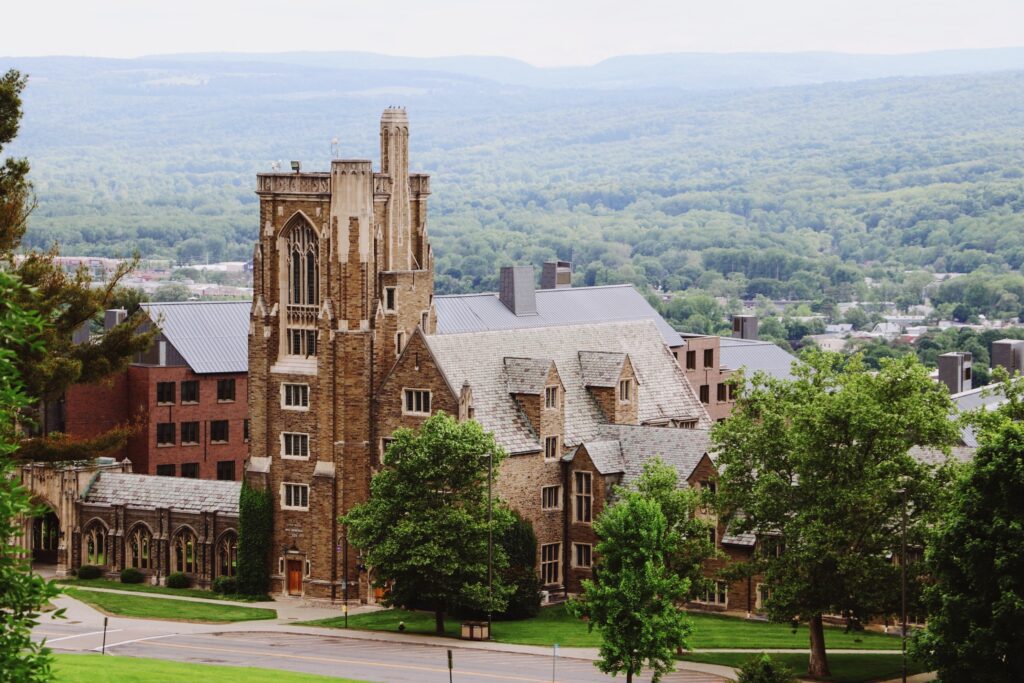
The virtual college tours at Cornell are self-guided. This means that you can take yourself around Cornell’s beautiful campus in Ithaca, NY, at your own pace. At each location, Cornell supplies fun facts and details about the campus that can help you get to know the school better.
5. Dartmouth College
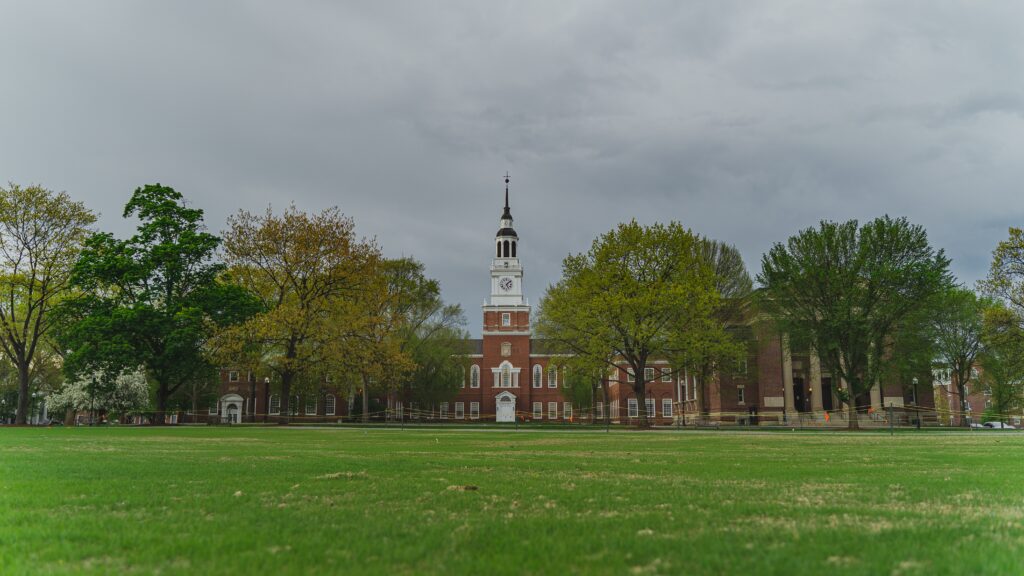
With Dartmouth’s virtual college tours, you can get the best of both worlds: a live-streamed campus tour and a self-guided tour. If you’re just beginning to think about Dartmouth as an option, watch their video of a pre-recorded tour to get a feel. If Dartmouth is your dream school, get to know their campus in bucolic Hanover, NH, by taking a live virtual tour led by a student—that way, you can ask all of your questions and feel more like you’re really there!
6. California Polytechnic State University (Cal Poly) – San Luis Obispo
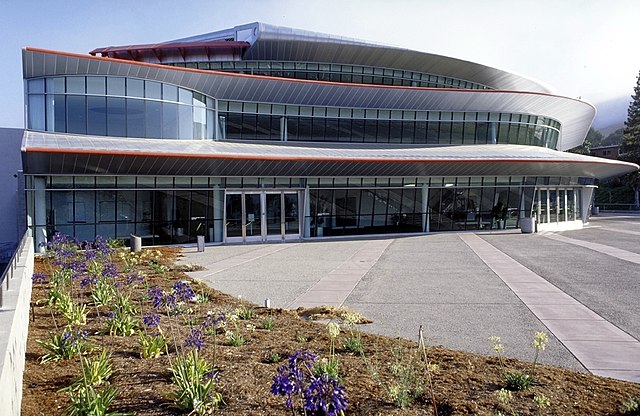
If you want to know more about Cal Poly in San Luis Obispo, they provide a wealth of virtual college tours that you can take. Not only does Cal Poly offer the classic student-led virtual tours and prerecorded tours. They also have virtual tours of their housing and of each academic college. Even if you can’t make it out to this coastal California city, you’ll have a great feel for the Cal Poly campus.
7. Barnard College
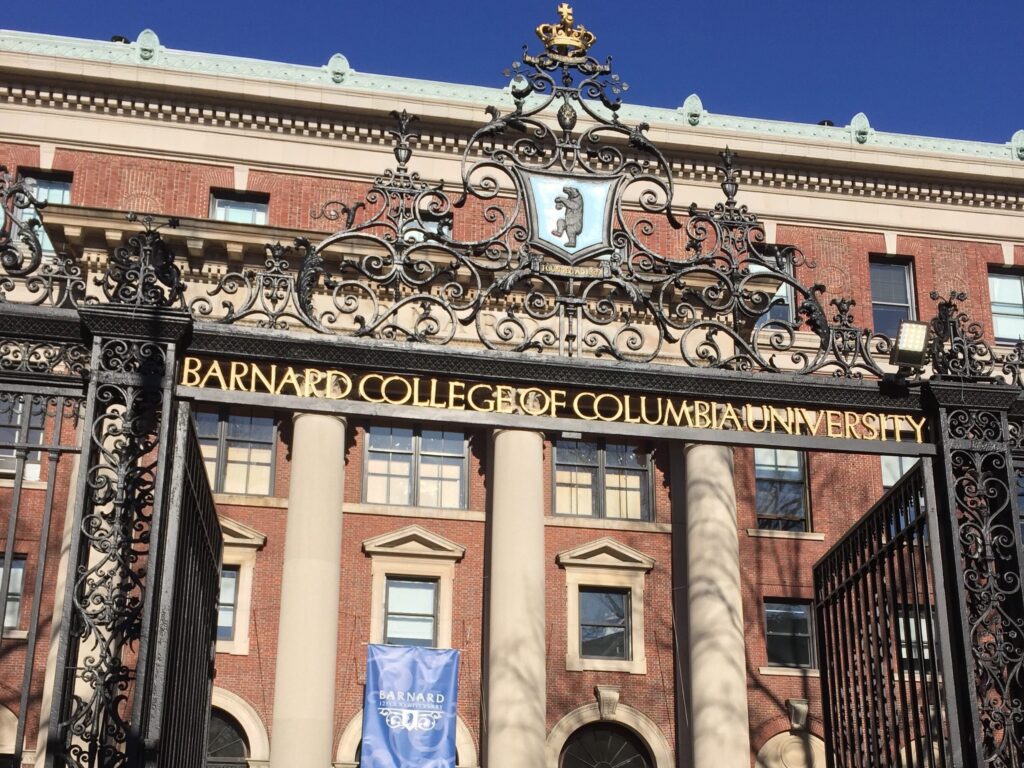
Curious about college in the Big Apple? Take one of Barnard’s virtual college tours. Once you register for Barnard’s virtual tour, you gain access to spaces in Barnard that aren’t even available on the in-person tour. Barnard also offers an audio tour, where you can listen along to a live tour guide.
8. Pomona College
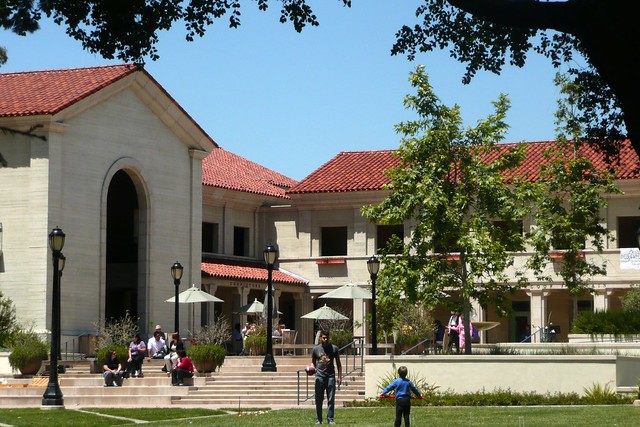
At Pomona, a college located in Pomona, California, you can explore in a multitude of ways. Pomona offers a pre-recorded virtual tour, as well as info sessions and webinars that you can attend from home.
9. University of Texas – San Antonio
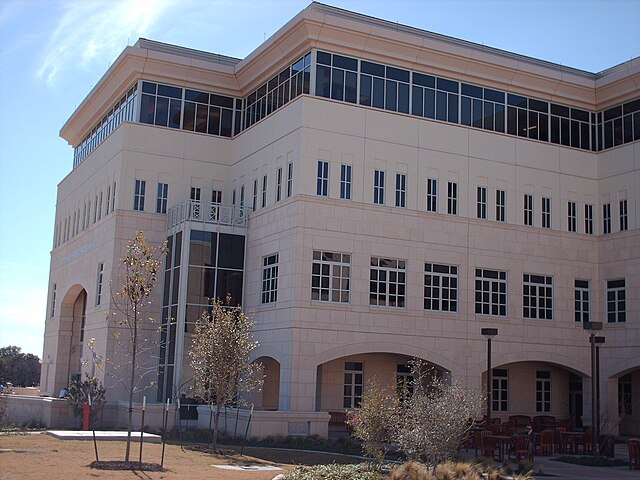
Located in San Antonio, TX, the University of Texas campus at San Antonio offers a self-guided virtual tour. At each location on the virtual tour, UT offers a video accompanied by written information to help you get to know the campus better.
10. Wesleyan University
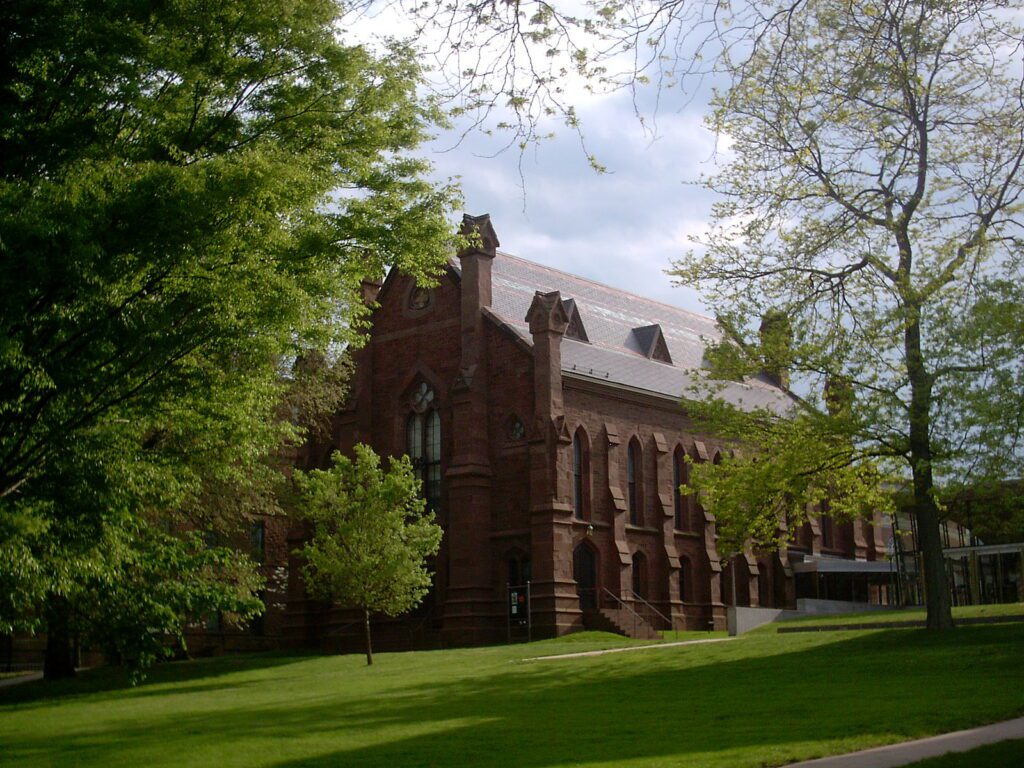
If you’re looking for an idyllic New England campus, you’ll find one with Wesleyan’s virtual college tours. Wesleyan is a small liberal arts school located in Middletown, Connecticut, and you can follow along with a current student as they “walk” you through different locations on campus.
11. Colgate University

Located in Hamilton, ME, Colgate’s beautiful campus is just a few clicks away. Colgate’s college virtual tours let students make their way through the campus on their own time, and you can supplement your virtual college visit with webinars and online info sessions.
12. Washington State University

Though Pullman, Washington would be beautiful to see in person, WSU’s college virtual tours will make you feel like you’re right there without ever leaving your house. WSU offers a personal tour, where you can direct yourself around the Washington State campus.
13. Bucknell University
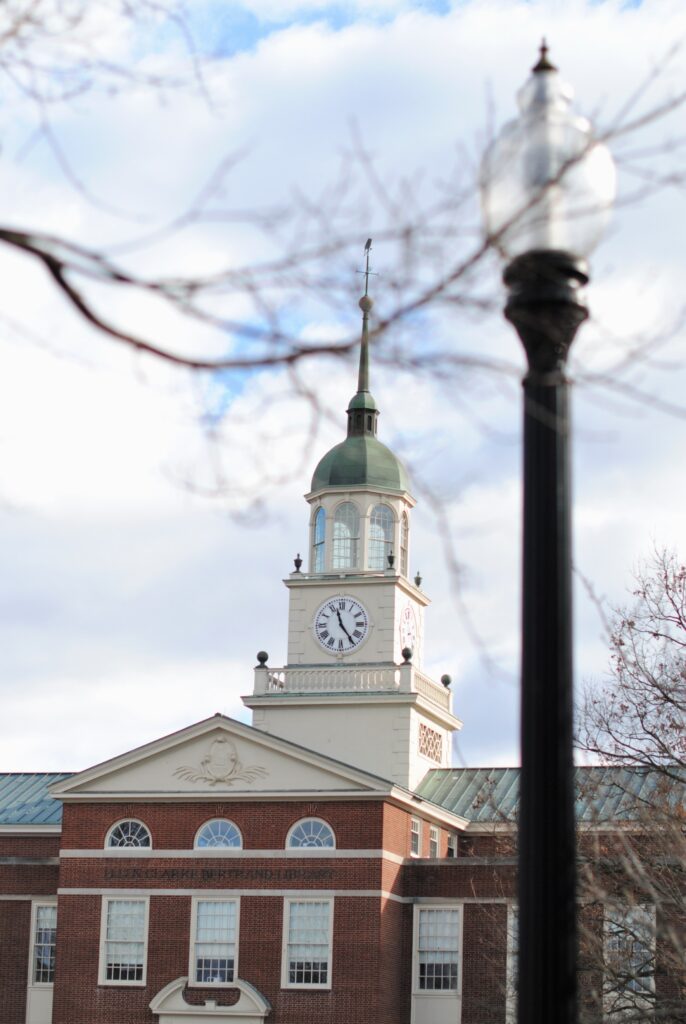
At Bucknell University, you can take college virtual tours by navigating through their virtual campus map. Though you might not get a feel of Bucknell’s location in Lewisburg, PA, you’ll come away with a great understanding of their campus—they even have a specialized map for prospective engineering students.
14. Vassar College
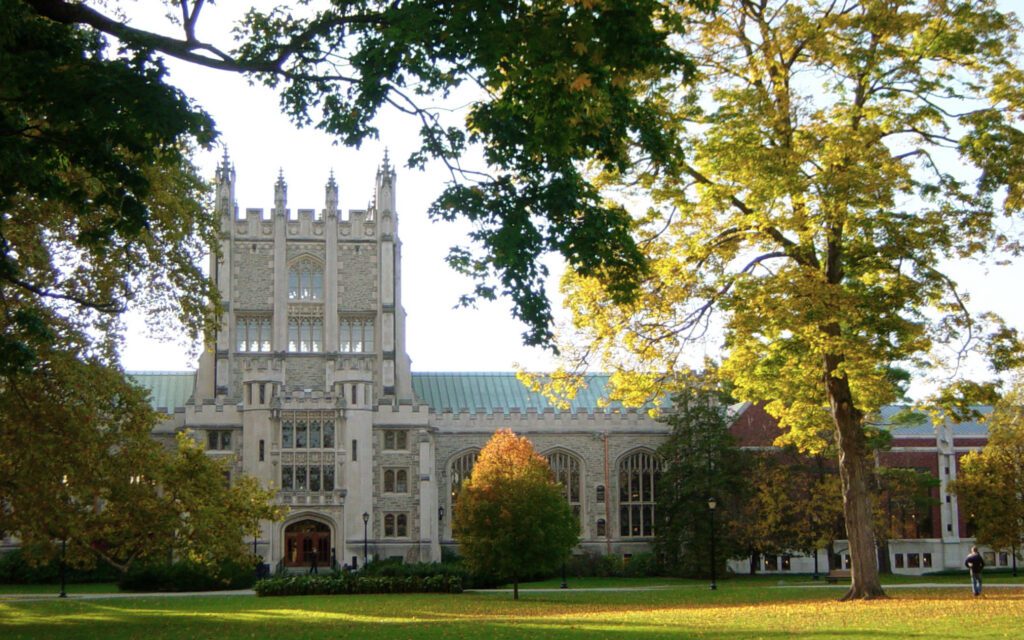
Next on the list of college virtual tours worth doing is Vassar. Vassar is located in scenic upstate New York, but if you don’t want to make the trip, you can easily get a feeling for the campus with their many options for college virtual tours. Vassar offers an interactive campus tour, a 30-minute preview video of the campus, and even sample classes and recordings of past events.
15. Claremont McKenna College
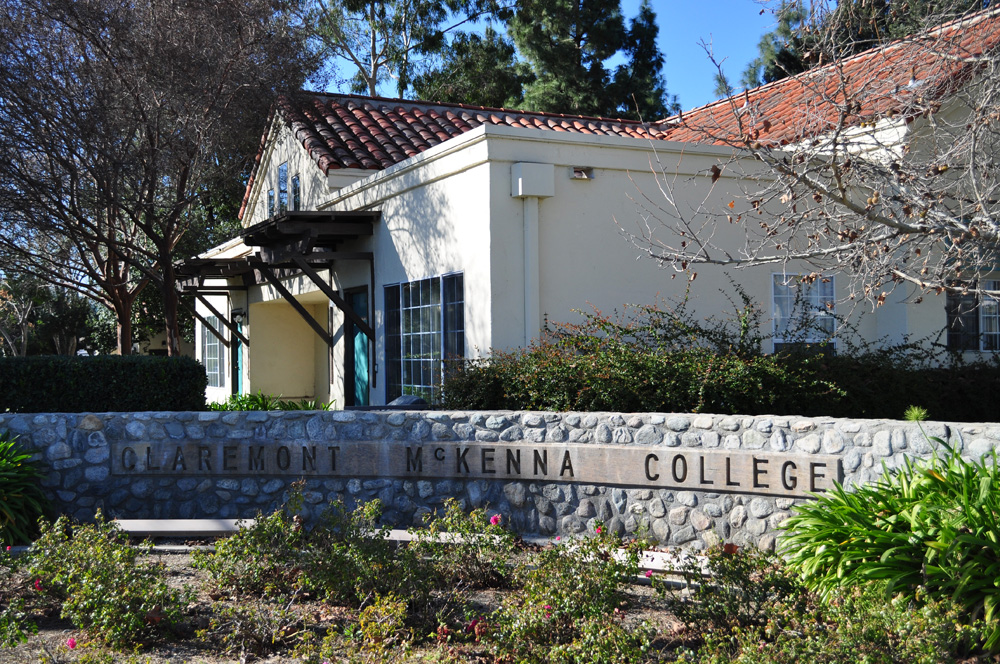
The second of the Claremont Colleges after Pomona, Claremont McKenna offers recorded video tours and self-guided college virtual tours. Claremont McKenna is also located in Pomona, CA. So, if you’re virtually touring Pomona, you might as well give Claremont McKenna a look as well!
16. Haverford College
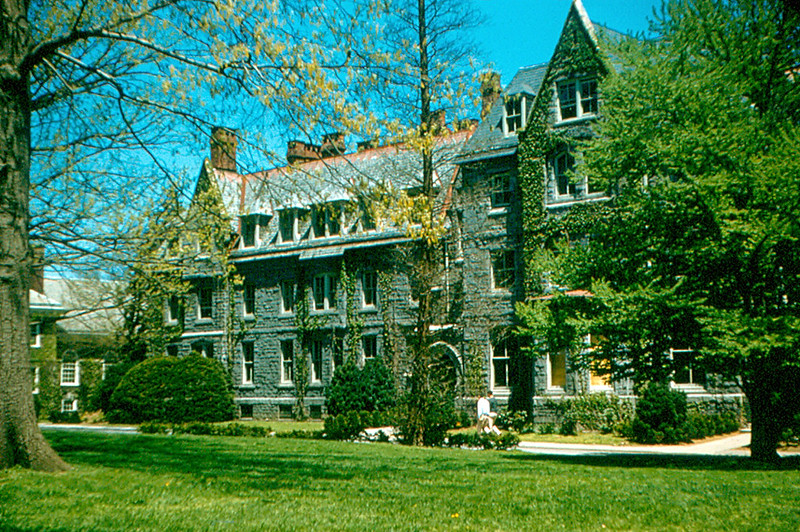
If you’re interested in living in Pennsylvania, you can give this lovely campus located just outside of Philly a look. Haverford offers live virtual tours where two students will take you on a “stroll” across campus, giving you advice and answering questions along the way.
17. Harvey Mudd College
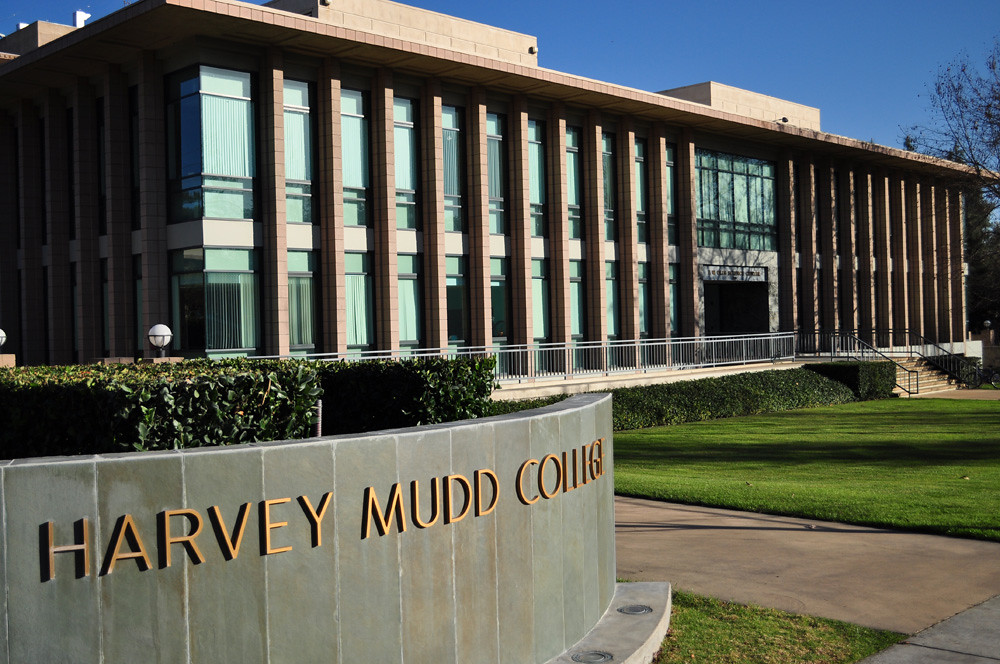
If you love Pomona, CA, but Claremont McKenna and Pomona weren’t your vibe, give Harvey Mudd a try. Harvey Mudd’s college virtual tours consist of separate videos for each stop along the tour that take you through all of the most important buildings on Harvey Mudd’s campus.
18. Middlebury College
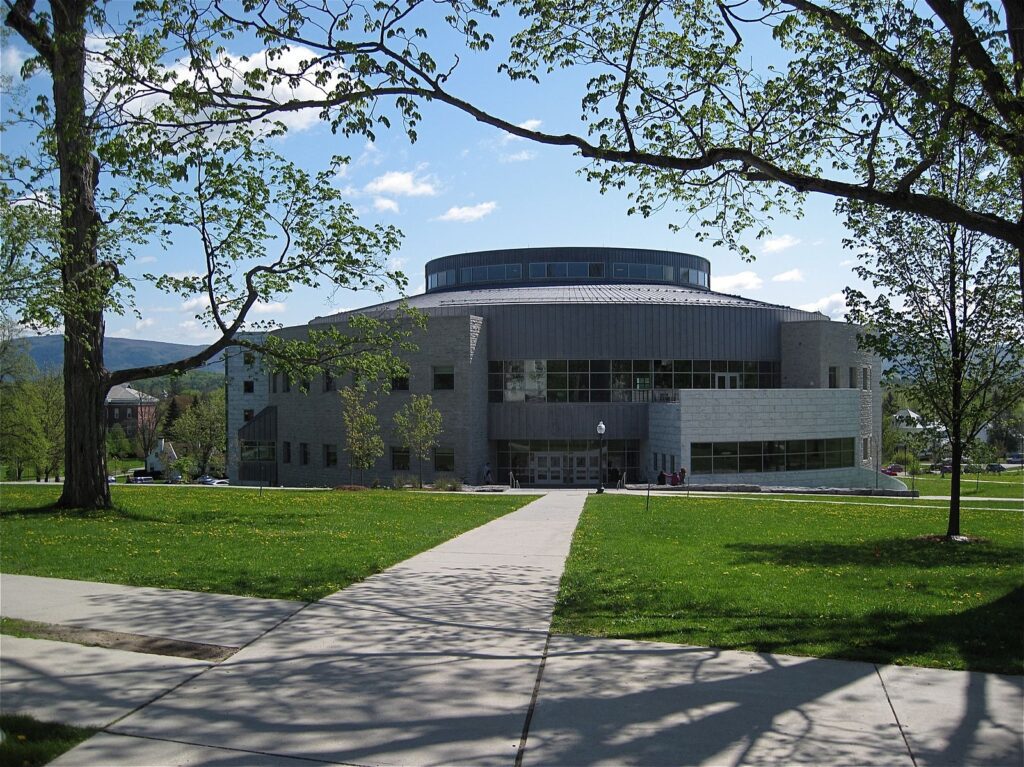
For your Middlebury College virtual tours, you get all the benefits of variety. Middlebury College, located in Middlebury, VT, has a wealth of options for students who don’t choose to do college campus tours in person. This includes virtual tours in English and Spanish, self-guided interactive maps, recorded information sessions, and more.
19. Pace University

If you want to get to know Pace University, the college offers interactive maps for both of its campuses—one in NYC and one in Westchester, NY. Using Pace’s maps, you can make the most of New York City college campus tours without ever having to navigate the subway.
20. Occidental College
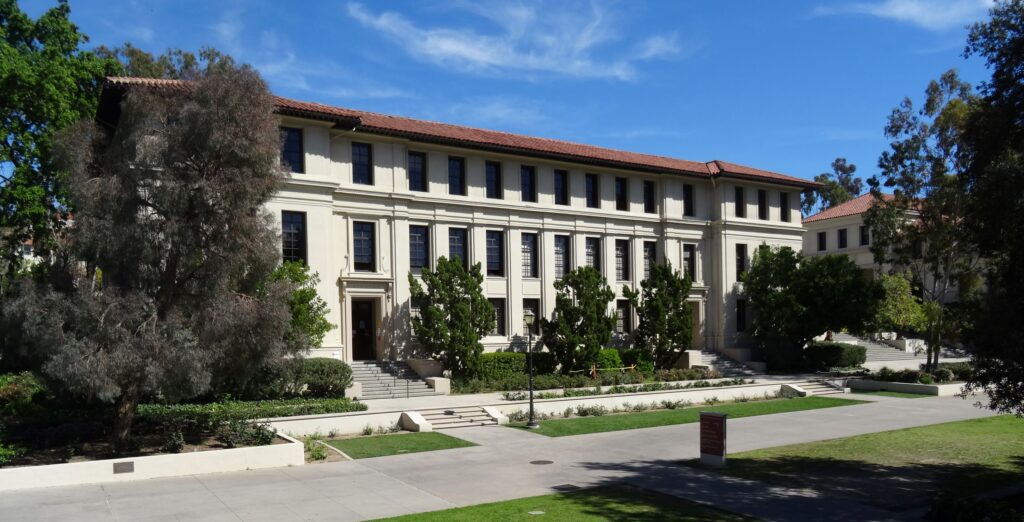
Next on our list of virtual college campus tours worth taking is Occidental College. Located in sunny Los Angeles, CA, Occidental offers a self-guided virtual tour, where you can click through 360 views of the campus and hear from Occidental’s student tour guides along the way.
21. Furman University

Located in Greenville, South Carolina, Furman University also offers stellar options for their virtual college campus tours. Furman gives you the option to explore individual campus buildings with interactive and immersive technology, which includes videos from their tour guides to give you insider knowledge about each location.
22. Spelman College
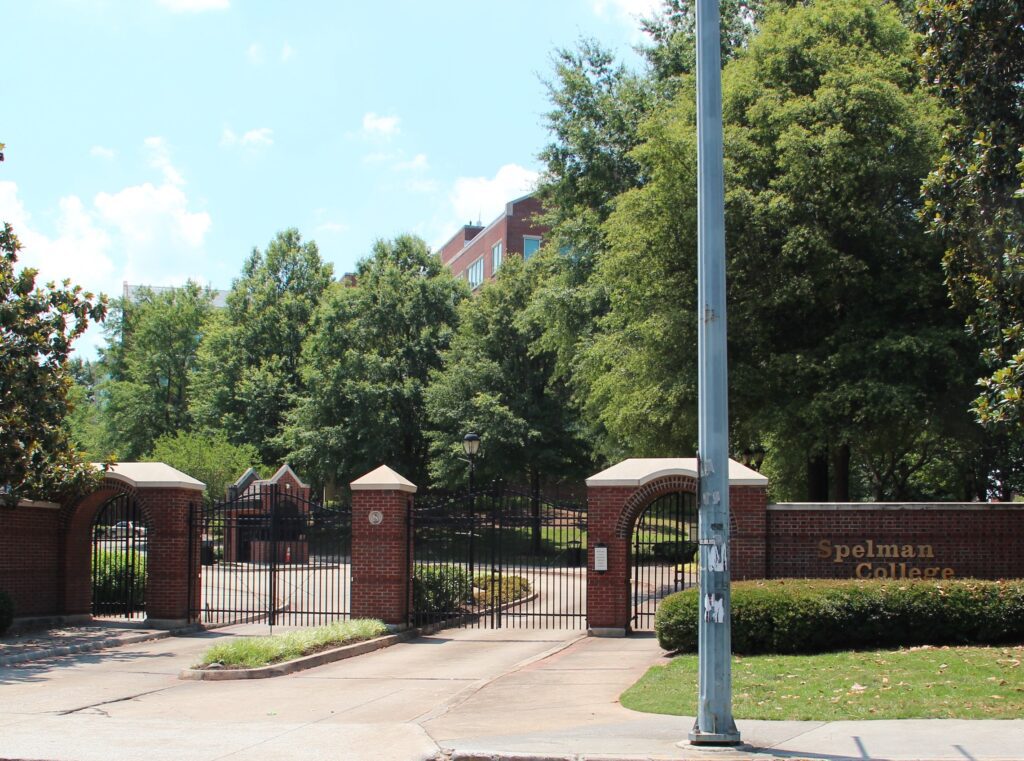
If you want to tour Spelman, you don’t have to go all the way to Atlanta, Georgia. You can take one of their virtual college campus tours, where you can take your time looking at each of their buildings. Spelman’s virtual map lets you see inside and outside of many different campus locations, and get a better feel for the vibe of the campus as a whole.
23. Emerson College
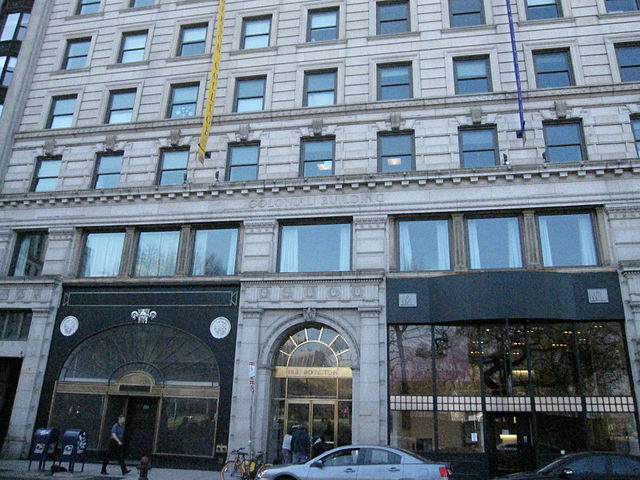
Located in Boston, MA, Emerson offers lots of options for students who want to take college virtual tours. Using an interactive map , prospective students can make their way around Emerson’s campus to explore different buildings and facilities. The Emerson campus map also includes some city landmarks, like Boston Common, that are close to campus and part of the Emerson experience.
24. University of Tampa

At the University of Tampa, students can take college virtual tours to get a feel for the beautiful Tampa, FL campus. The University of Tampa offers tour videos, 360 interactive campus tours, as well as virtual visits. If you register for a virtual visit, you’ll also be able to attend a 30-minute info session hosted by an admissions counselor.
25. Texas State University
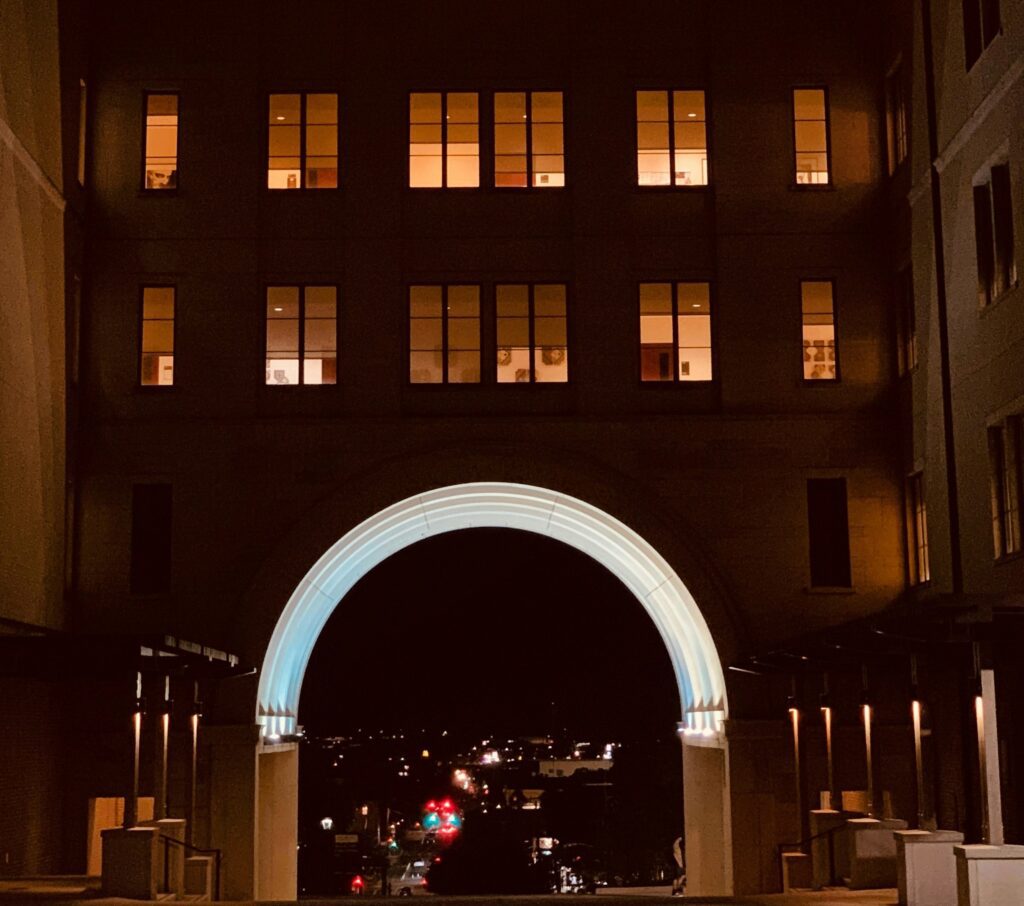
For the last school on our list of college virtual tours worth taking, we visit (or more accurately, don’t visit) Texas State. Texas State offers a virtual interactive map, a video tour led by student tour guides, and also provides a presentation where you can learn more about the academics and admissions policies at the school. You can tour both of Texas State’s locations, one in San Marcos and one just north of Austin.
As you can see, not all virtual college visits follow the exact same format. However, there are certainly many opportunities to “visit” a school without ever stepping foot on campus. Next, let’s talk about scheduling and making the most of your college visits.
How To Schedule Virtual College Visits
Now that we’ve gone over some of the best virtual college tours that you can take, let’s talk about some logistics.
For most virtual college tours, you can take them whenever you want—that’s part of why they’re so great! Whatever your schedule is, you can slide in a college visit on your own time. You could even do a bit of a virtual college visit, take a break, and come back and finish later. It’s totally up to you.
Schools may ask you for your name and email when you click on their virtual college visits. This is totally fine, and also can work to your advantage. Remember demonstrated interest? You want the college to know that you’ve taken their college campus tours, whether it’s a virtual college visit or in-person. This is especially meaningful in college visits for juniors or seniors.
Even though many virtual college visits can be done on your own schedule, some schools offer live virtual tours. If you want to take one of these college campus tours, you’ll need to sign up in advance. Even though these virtual college tours for students require a little bit more planning, it can be helpful to be in a Zoom with other prospective students and tour guides so that you can ask questions in real time.
Making the Most of a Virtual College Visit

Even though you might be taking your virtual college tours from your bed, it’s important to still make the most of it. While a virtual tour might not feel the same as in-person college campus tours, there are some things you can do to make the most of the experience.
Block out dedicated time
At first, virtual college tours for students might not seem very outwardly engaging. However, you should try and make the most of your experience. Don’t multitask, or do college campus tours while you’re watching TV. This is still a college visit, and you want to treat it as such. Immerse yourself in your virtual college visit—you want to get as close as you can to experiencing it in person!
Consider your priorities
Virtual college visits can serve different purposes for different students. Some students have no idea what they’re looking for from their college campus, and others are already set on what they want their college experience to look like. On the virtual tour, make sure to look at the school’s housing, academic facilities, recreational facilities, and transportation. If there’s a must on your list—for example, if you want a school with a main quad, or a school that’s integrated into a city—see if the school has it!
Ask questions
If you’re taking a tour on your own, think about the questions you’d have for a tour guide if there was one present. What can you learn from virtual college tours for students, and what do you still have questions about? These are the kinds of things you could ask in an information session or research after your tour.
Next Steps after your Virtual Tour
Once you’ve finished your virtual tour, there are some next steps you can take to make the most of it.
If you’re just starting to build out your college list, think about what stood out most from your campus tours. Write down some big takeaways from the school, or a list of pros and cons, so you can start comparing schools that you want to put on your college list. These can be informal—something like “huge library,” or “weird vibe” is totally fine—just make sure you write down enough to remember how you felt about the school so you don’t have to take the virtual tour a second time.
If you’re ready to apply, reach out to admissions with any questions you have after the virtual college tours. Explore the application requirements at the schools you’re most excited about. See if the school has any supplemental essays that ask you why you’re interested in the school—these virtual tours can give you great talking points about the school that you might want to include in an essay.
Sometimes after a virtual tour, you might still not know how you feel about a school—that’s okay! Virtual tours are just one way to get to know a college. You can keep doing research, and take advantage of other virtual resources offered by the school.
Even More Virtual Opportunities

So what are the other ways to learn more about a school from the comfort of your own home?
Along with the virtual campus tour, many schools also offer virtual information sessions. These are Zoom calls with admissions officers who are there to provide information on the school and answer applicants’ questions. Attending information sessions can also be a way to show demonstrated interest to a school that you want to attend.
Some schools also have student testimonials, or other videos with students who can answer questions about the school. These are a great way to see what actual students think about attending the school. Many colleges also provide a way to reach students at the school with questions—email the admissions office and ask if there are students you can talk to about their experience.
Virtual College Tours – Final Takeaway
College visits for juniors, seniors, and sophomores are an important part of the college admissions process. Since the pandemic, you can go on amazing virtual college visits from the comfort of your own home. On a virtual college tour, you can get to know the campus, and see what kinds of resources the school has to offer.
There are a few different types of virtual college tours for students. Some are interactive maps, where you can click on different buildings and explore. Others provide a 360 view of various parts of campus. Some are live Zoom meetings led by student tour guides, and some schools provide pre-recorded videos that you can watch. All of these virtual tours are great options to learn more about the school, and if a school provides more than one, they’re all worth doing!
When you’re taking a virtual college tour, make sure to make the most of it. Set aside some time to really focus on the tour, keep your priorities in mind, and take notes on things that stick out to you and questions you have during the tour.
If at the end of your virtual tour, you’re sure that you’ve found your dream school, don’t hesitate to reach out to CollegeAdvisor for application guidance. Our team of experts is always here to support students in navigating the admissions process. Happy (virtual) exploring!

This article was written by senior advisor Courtney Ng and advisor Rachel Kahn . Looking for more admissions support? Click here to schedule a free meeting with one of our Admissions Specialists. During your meeting, our team will discuss your profile and help you find targeted ways to increase your admissions odds at top schools. We’ll also answer any questions and discuss how CollegeAdvisor.com can support you in the college application process.
Personalized and effective college advising for high school students.
- Advisor Application
- Popular Colleges
- Privacy Policy and Cookie Notice
- Student Login
- California Privacy Notice
- Terms and Conditions
- Your Privacy Choices
By using the College Advisor site and/or working with College Advisor, you agree to our updated Terms and Conditions and Privacy Policy , including an arbitration clause that covers any disputes relating to our policies and your use of our products and services.
Please turn on JavaScript in your browser It appears your web browser is not using JavaScript. Without it, some pages won't work properly. Please adjust the settings in your browser to make sure JavaScript is turned on.
Should you take summer college classes.
Senior Associate, JPMorgan Chase

For some college students, summer is a time for beach hangs, barbecues, and relaxation. For others, it’s a time for internships or part-time jobs . It can also be a time of year to take classes. Whether you’re an existing or recent high school graduate looking to get a head start on their college classes, or an existing college student looking for an opportunity in the year to take additional credits, many students pursue taking summer college classes.
But how do you know if summer college classes are right for you? Let’s break down the pros and cons of taking classes during the summer so you can make an informed decision.
The pros of taking summer classes in college
There are many upsides to taking summer college classes. Here are a few to consider as you make this choice.
1. Summer college classes may cost less
Though this won’t always be the case, some schools have cheaper tuition and fees in the summer than in the academic year. In some cases, this is because they’re offering classes online and charging less because of that.
In addition, some state schools offer out-of-state residents the ability to pay in-state tuition during the summer term.
Yet another reason that summer college classes may cost less is some students opt to enroll in classes outside their home college or university in the summer, including at community colleges, which often charge lower tuition than four-year colleges. Community colleges are two-year schools that provide an affordable pathway to earning college credits. If you’re interested in this path, just make sure any class credits you take will transfer to your home institution.
2. Enrolling in summer classes may help you graduate earlier
A potential benefit of taking summer classes is they may open the possibility of graduating from college early. By taking summer classes between academic years, you may be able to amass the number of required college credit hours needed to graduate a semester or more early. This may have several benefits, including the ability to save money on a college degree and the ability to enter the workforce or graduate school earlier.
3. Summer classes may help you make up for failed classes
If you failed a class and can retake it either to replace your grade or average two grades, the summer session may be the time to do it. You’ll have to check in with your academic advisor to understand your school’s specific policies around the options to do this.
4. Summer classes may help you build new skills
You may want to take a summer class due to an interest in a particular subject. Maybe you’re eyeing a trip abroad and want to brush up on a language. Or perhaps you want to boost your competitiveness in the job market and add new skills to your resume, and there’s a class on the summer schedule to help you do that. Summer classes can be a time to take classes that you might not have time for during the academic year.
5. Summer classes may help you double major or minor
A potential benefit of taking summer classes is that they may open up the opportunity to double-major or minor. The summer may be a flexible window of time to squeeze in the requirements for a second major or a minor.
6. Summer classes may offer perks like smaller class sizes
In some instances, you may find that taking summer classes offers perks like smaller class sizes and more access to professors. If you’re a student who thrives from personalized attention, this may be a consideration to make if you’re weighing taking summer classes. If this is important to you, make sure to check with your school to find out what class sizes to expect.
The potential cons of taking summer classes
While there are many potential upsides to taking summer college classes, there are also a few potential downsides to consider, too.
1. The condensed schedule of summer classes may be challenging
Since summer classes are often shorter than fall and spring classes, you may find that you have less time to absorb material and prepare for tests and exams. For some students, this may not feel like a problem, but for others, it may feel stressful.
2. Taking summer classes won’t allow for a true summer break
While you can still enjoy your summer break even while taking summer classes, if you do decide to take summer classes you may end up feeling like you didn’t get to have a true chance to unwind from school.
3. The summer term might not have as many class choices
One potential downside of taking college classes during the summer is that there may be fewer options for course selection. If you’re considering summer classes, check with your college’s registrar’s office in advance to see if the classes you’re interested in taking will be available in the summer.
4. Your financial aid may not help in covering summer classes
If you’re receiving federal financial aid, you can hypothetically use this money to help pay for summer classes. There’s a nuance to this, though, that is important to understand – you won’t be eligible for more financial aid because you want to take summer classes.
If you’re using summer classes as a path to graduate early, you may find that summer classes provide an opportunity for cost savings unto themselves. You may also have enough financial aid to cover both the academic year and summer classes. Still, make sure you go in with your eyes wide open when it comes to taking summer classes and using financial aid.
5. Taking summer classes will provide fewer opportunities for internships
Some students use their summer breaks as opportunities to get internships. Internships can be a great opportunity to explore fields of work that may interest you, network, and get a sense of what working may be like after college. Taking summer classes may interfere with the ability to pursue summer internships if that’s something you’re interested in.
6. Taking summer classes may provide fewer opportunities to get part-time work
Some students may use the summer break to get a part-time job to earn money (for tuition, living expenses, to help family members, among other reasons). It may be a challenge for students to take both summer classes and to pursue part-time work.
Common FAQs about summer college classes
When do summer classes start.
Summer classes in college typically start after the spring term ends, usually in late May or early June.
Does financial aid cover summer classes?
While most financial aid, including federal financial aid, will cover summer classes in college, students don’t necessarily receive additional financial aid because they decide to take summer classes. So, if you’ve already used your financial aid for the school year, you won’t necessarily have additional financial aid to cover summer classes. All of that said, there may be scholarships or grants to apply to specifically to help cover summer classes.
How many summer classes can I take?
The number of summer classes a college student can take varies widely among institutions and is influenced by the structure of a school’s summer session. Typically, students enroll in one to three courses per summer session, with the total allowable credits ranging from three to nine or more. Institutions that offer multiple, shorter sessions may allow students to take courses in each session, potentially enabling them to complete more credits over the entire summer.
Are summer classes harder?
Summer college classes aren’t on the surface “harder”, but some students may find them more challenging, primarily because of the condensed timeline. Unlike traditional college terms, summer courses often compress the same amount of material into a shorter period, which may span from four to eight weeks. The intensity of this schedule may be demanding for some students.
How long are summer classes?
The structure of summer sessions can vary significantly between institutions. Many colleges offer different types of summer terms. For example, some colleges have one long summer session that spans almost the entire summer. In contrast, other colleges offer multiple shorter sessions split up throughout the summer. These shorter terms typically range from four to eight weeks.
Are summer classes cheaper?
Some schools have cheaper tuition and fees when it comes to their summer classes. This may be because they offer classes in an online format and charge less. In other instances, some state schools offer the ability for out-of-state residents to pay in-state tuition during the summer.
Lastly, some students opt to enroll in classes outside their home college or university in the summer, including at community colleges , which may charge lower tuition than four-year colleges.
Final thoughts
Figuring out if summer classes are right for you will come down to analyzing your goals. Do you want to graduate early, make up for a failed class, or take a class you might not otherwise have a chance to? Or is using the summer to get work experience, make money, or simply to relax important to you? Weigh the pros and cons carefully to decide the best course for your situation.

IMAGES
COMMENTS
The best time during the week is from Monday to Thursday. The campus is busy with students going from class to class or mingling around. The best season to visit colleges is at the beginning of the fall session. The time various from college to college and includes late-summer to the early of September. Spring time can also be ideal especially ...
Mondays through Thursdays are ideal for visits because you can get a good idea of what campus life is like. Visiting on a Friday may not be as practical. Students, faculty, and staff might be busy with social activities starting Friday afternoon. High school holidays that fall on Mondays are often perfect opportunities for making college visits ...
This guide explains pros and cons of college tours for high school students, as well as how to schedule them. Call Direct: 1 (866) 811-5546 Sign In Start Free ... make sure to take your time and make the most of your visit by focusing on one tour per day. Most high school students are granted several excused absences in junior and senior year ...
Step 2: Call the college or university's admissions office. Don't set up a visit online. Talk to an actual person. Or, if you do set up a visit online, call and make sure the admissions office received your scheduled visit—and that it didn't get lost in cyberspace. Have a detailed conversation about what you'd like to do when you're ...
Why High School Juniors Should Visit Colleges. 1. High school juniors are ready to see what college is really like. Juniors in high school are pretty mature. They know what subjects they like and dislike. High school juniors might have a sense of what they'd like to major in in college.
For high school students in the process of researching a variety of colleges and ... 21 Places Worth Seeing on College Tours. 15 Fun College Towns in the South. 20 Fun College Campuses for ...
And you can plan your own informal visit to a college campus. Take these important steps first: Visit the college's admissions website to get details about arranging for an in-person visit. Check with your school counselor to see if any campus tours are scheduled. Set aside time to be on your own. Walk around the public area.
Things to Do on a Campus Tour. Gather Important Information. Pick up brochures, financial aid forms, and the campus map. Try to sit at the back of a classroom that interests you. If classes aren't in session, you can still stop in a classroom or lecture hall to get a sense of the environment. Meet a professor who teaches a course you're ...
What Parents Should Do BEFORE a College Visit ... The student leading the college tour is, in a way, an extension of the school's marketing department; speaking with a few students on campus will offer a few different perspectives. ... 25 Summer Art Programs for High School Students in 2024. March 26, 2024 10th Grade, 11th Grade, Summer ...
Planning University and College Tours in 2023. Every fall I meet with students to establish their plan of action for the course of their 10th and 11th grade years. This meeting includes conversations about course selection, when and what standardized test to take, and what schools should they start to view. I spend hours planning tour routes ...
1. As Soon as Possible. Visiting colleges and universities as soon as possible allows you to visit more campuses in the future! Some highly recommend you start your college tours during sophomore year, junior year at the latest. If you have an older sibling, it's a good idea to tour with them even if your own college experience is still a few ...
Interacting with students and faculty can give you insight into the campus culture, work-school balance, and support most high school students don't get. When visiting campus, college tours also give you the chance to attend information sessions and meet with admissions counselors. These opportunities can help you understand the college's ...
A key part of deciding which college to go to is finding a good fit. And a great way to get more information is to visit the colleges in person. Virtual tours are also a great way to learn more about a campus. It can help you determine whether a college is the right place for you and prepare you for a campus visit at your convenience.
Students and parents should plan college tours starting in 9th grade. That should give high school students enough time during freshmen, sophomore and junior years to visit several different college campuses, take the official college tour, and narrow down their preferences and final college list before senior year.. Most colleges offer daily walking campus tours during the week and some also ...
However, if you have the time to spare, spend an entire day at the school and personalize your visit by meeting with administrators, faculty, and students who can provide additional perspectives on the school. If the school allows it, make an appointment to meet the admissions officer who reads your geographic region.
Virtual college tours and information sessions can be valuable alternatives for colleges that are harder to visit in person. For instance, Harvard tours can be in-person or virtual. Therefore, if Harvard is on your list, plan your Harvard tours accordingly based on your availability and resources. 4.
It is best to visit colleges during the fall or spring semesters. Each college posts its academic calendar online. Make sure you are visiting when classes are in session and students are on campus. This will give you the best feel for the campus culture and you can request to sit in on a class in your program/major!
College tour guides say you should be on time, let students take the lead during campus visits, and be sure to get all your questions answered. ... and for many high school students and their ...
Virtual tours can be a great place to start, and many schools offer these on their websites to prospective students. With just a click of a mouse, you could be exploring a campus that's located on the other side of the country - or even the other side of the world. It's not always practical to travel to every college you're considering ...
Ryan Lytle of U.S. News & World Report recommends that you start visiting campuses early in your high school career. Though some students wait until their senior years, Lytle points out that seniors have busy schedules and may not have enough time available to take a full tour. Some suggest taking tours while on family vacations in the summer ...
April 25, 2022, at 5:46 p.m. College Visits: Do's, Don'ts for Parents. More. Getty Images. Parents should assist their child on campus visits without micromanaging or projecting their own wishes ...
Shawna Newman. September 07, 2021. College visits and tours are a key part of the college search. H igh school students and their families often visit the colleges they're interested in attending. This serves as a great way to pick the best fit, and to understand the location of your top-choice colleges—after all, you will be considering ...
We help students and families through the entire college planning journey - from search, applications and essays to interview prep, financial aid consultation and final school selection. Contact us at [email protected] or by phone, 845.551.6946. We work with students through Zoom, over the phone, and by email.
College tours for high school students should be about the students looking to attend university. Traveling with a group of peers, students may be more comfortable asking their own questions. It may also make it easier for them to visualize themselves attending college on their own. Aside from that, many parents cannot travel with their ...
The reality is very different. With few exceptions, summer programs do not represent the university during the regular year—regular students go home, and regular faculty primarily pursue research.
Next on our list of virtual college campus tours worth taking is Occidental College. Located in sunny Los Angeles, CA, Occidental offers a self-guided virtual tour, where you can click through 360 views of the campus and hear from Occidental's student tour guides along the way. 21. Furman University.
1. The condensed schedule of summer classes may be challenging. Since summer classes are often shorter than fall and spring classes, you may find that you have less time to absorb material and prepare for tests and exams. For some students, this may not feel like a problem, but for others, it may feel stressful. 2.